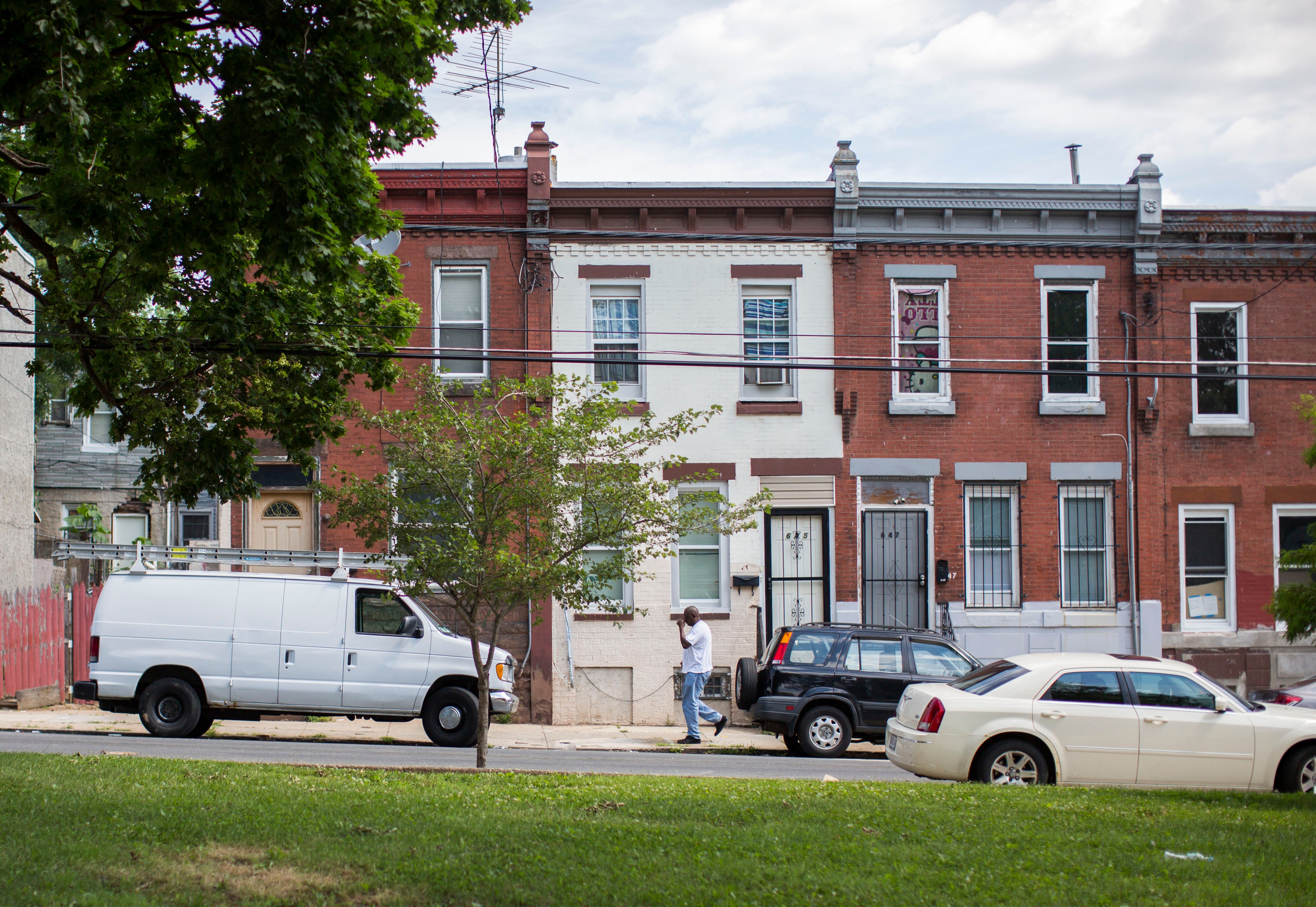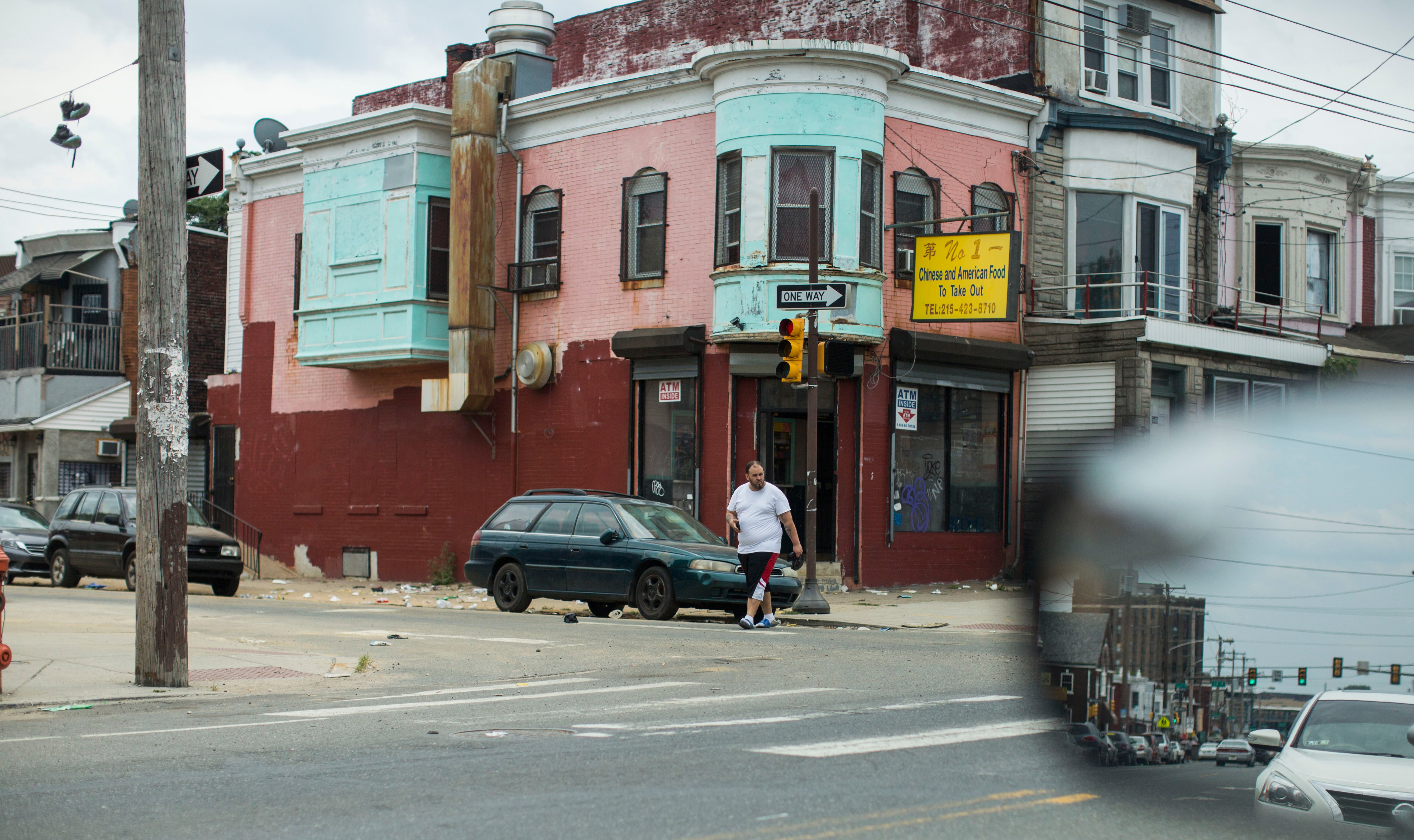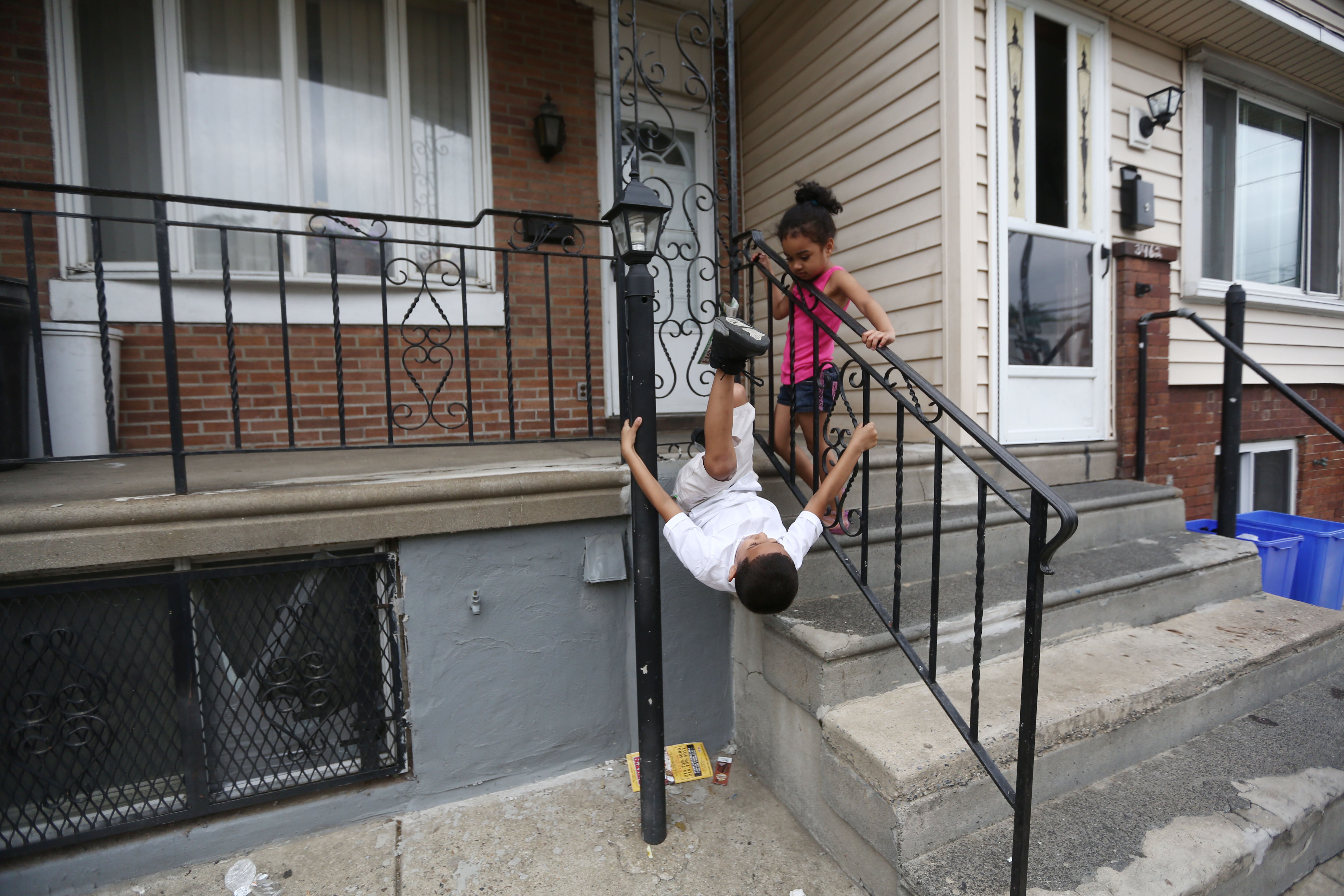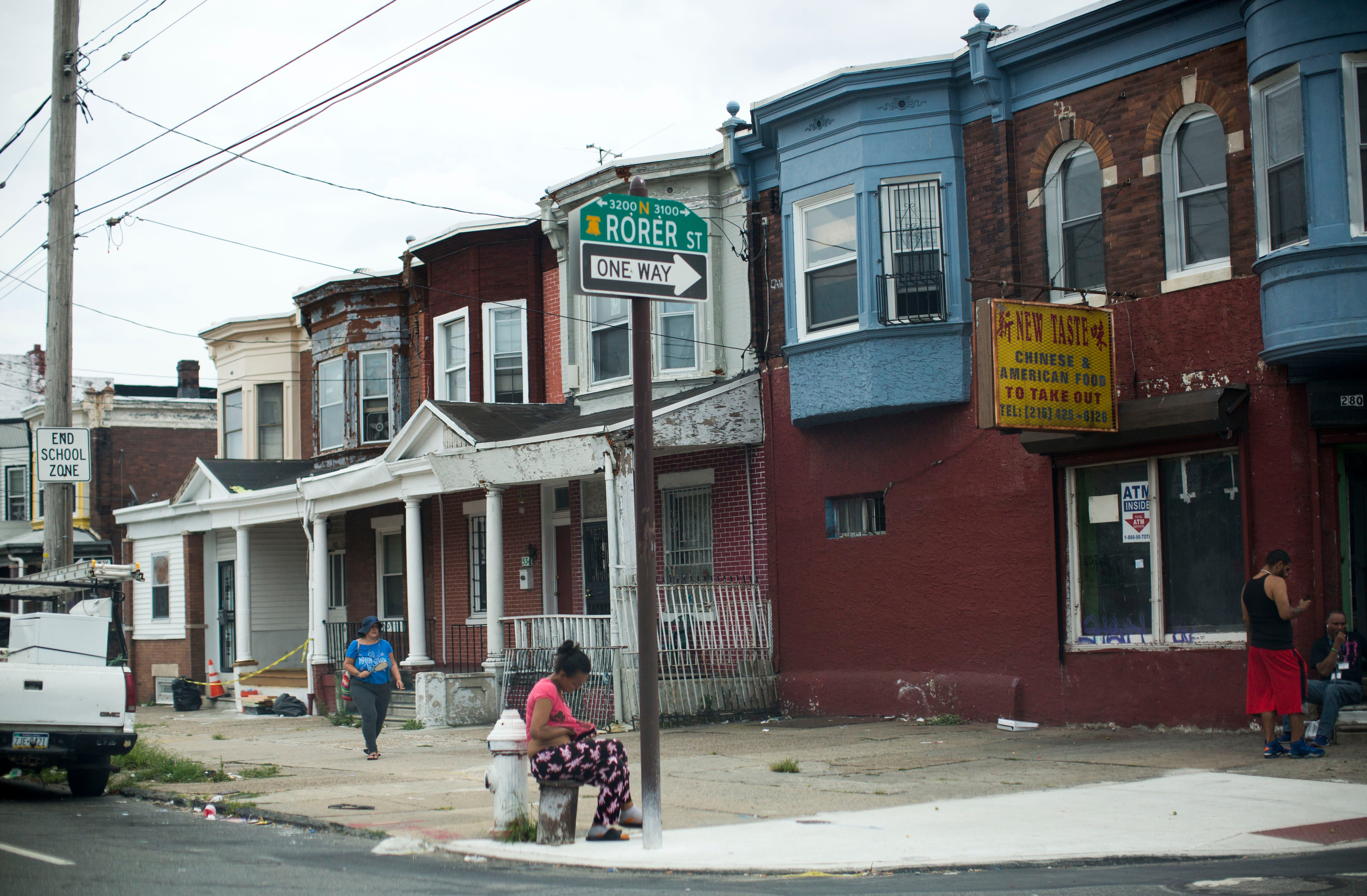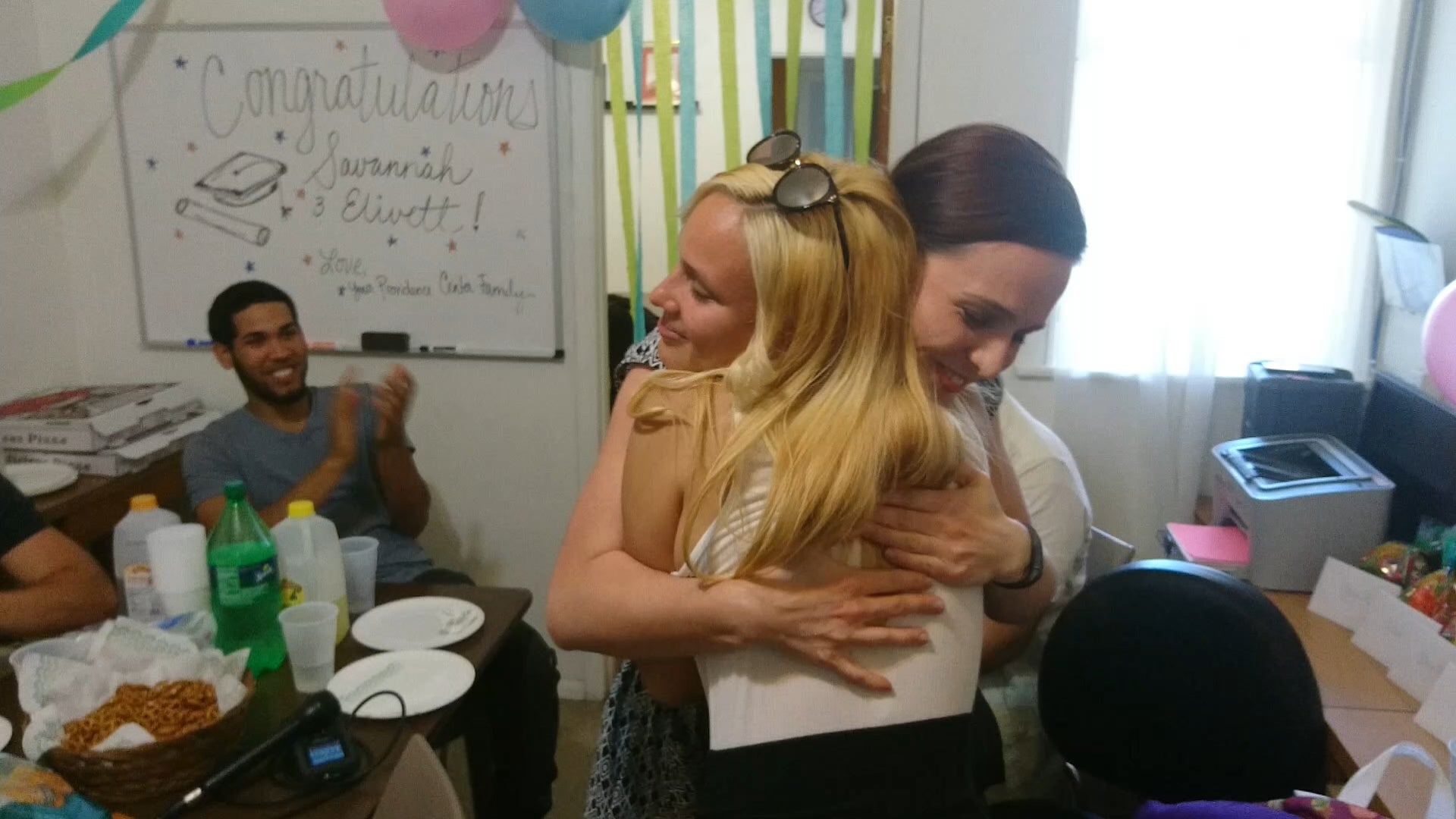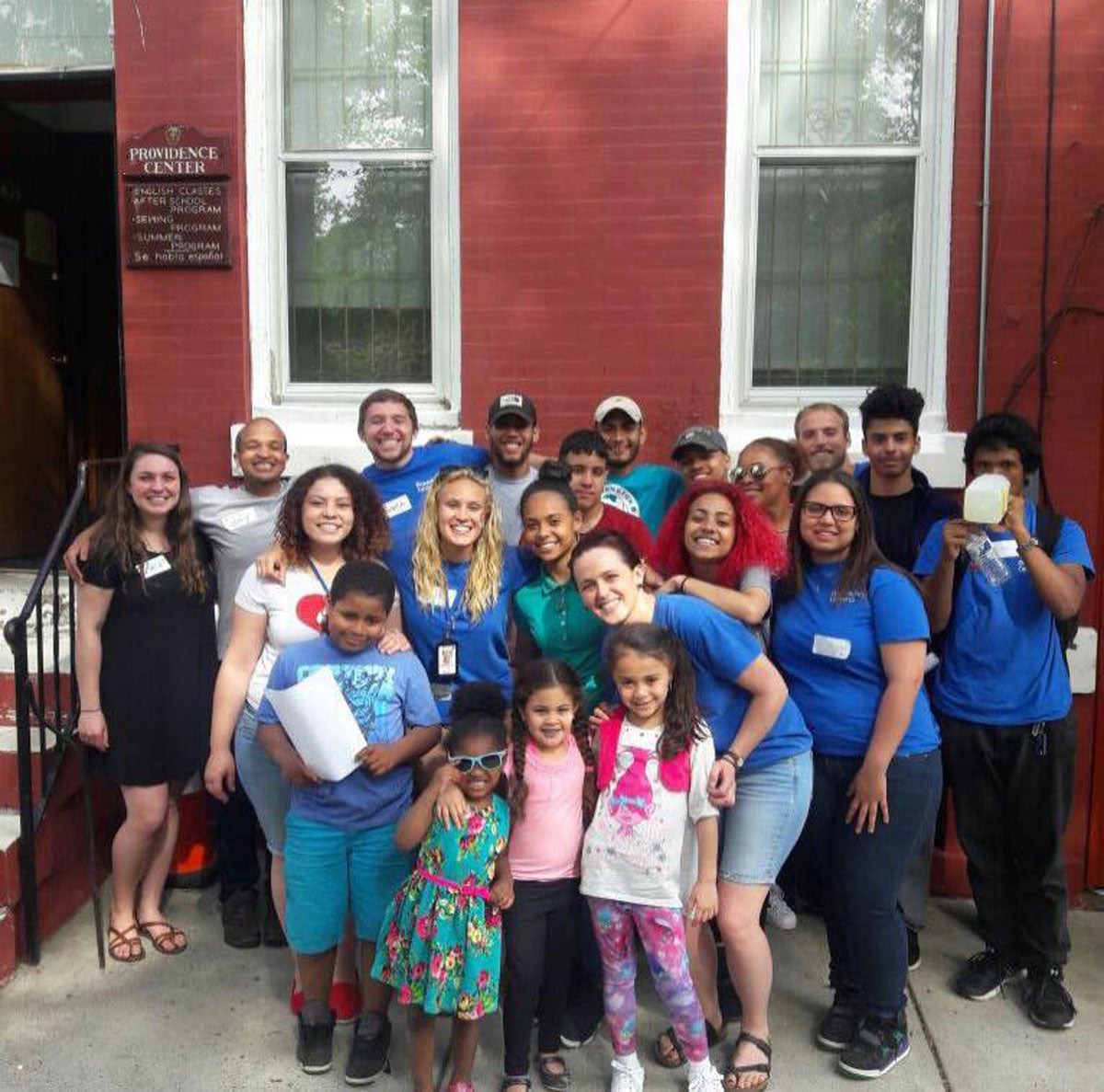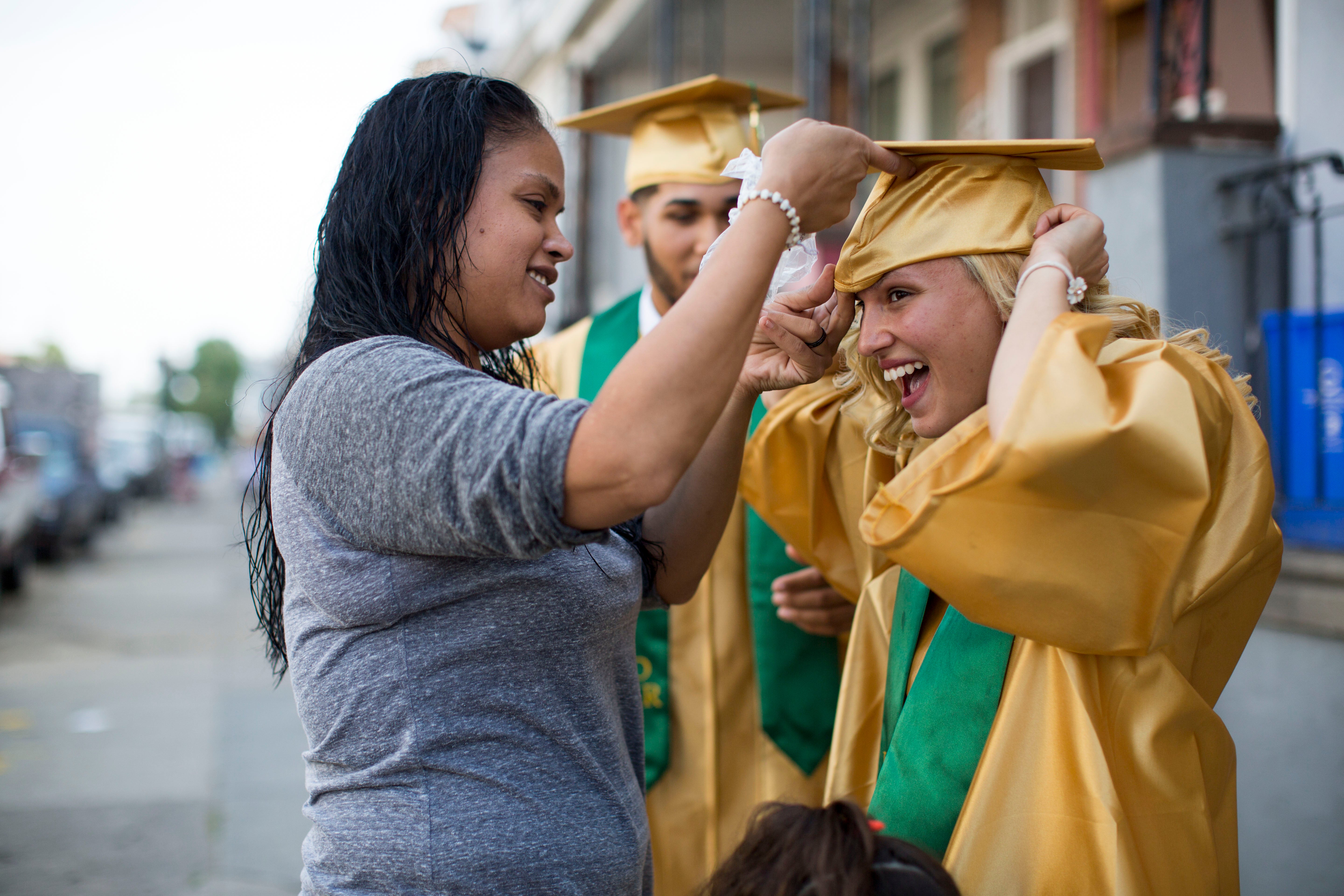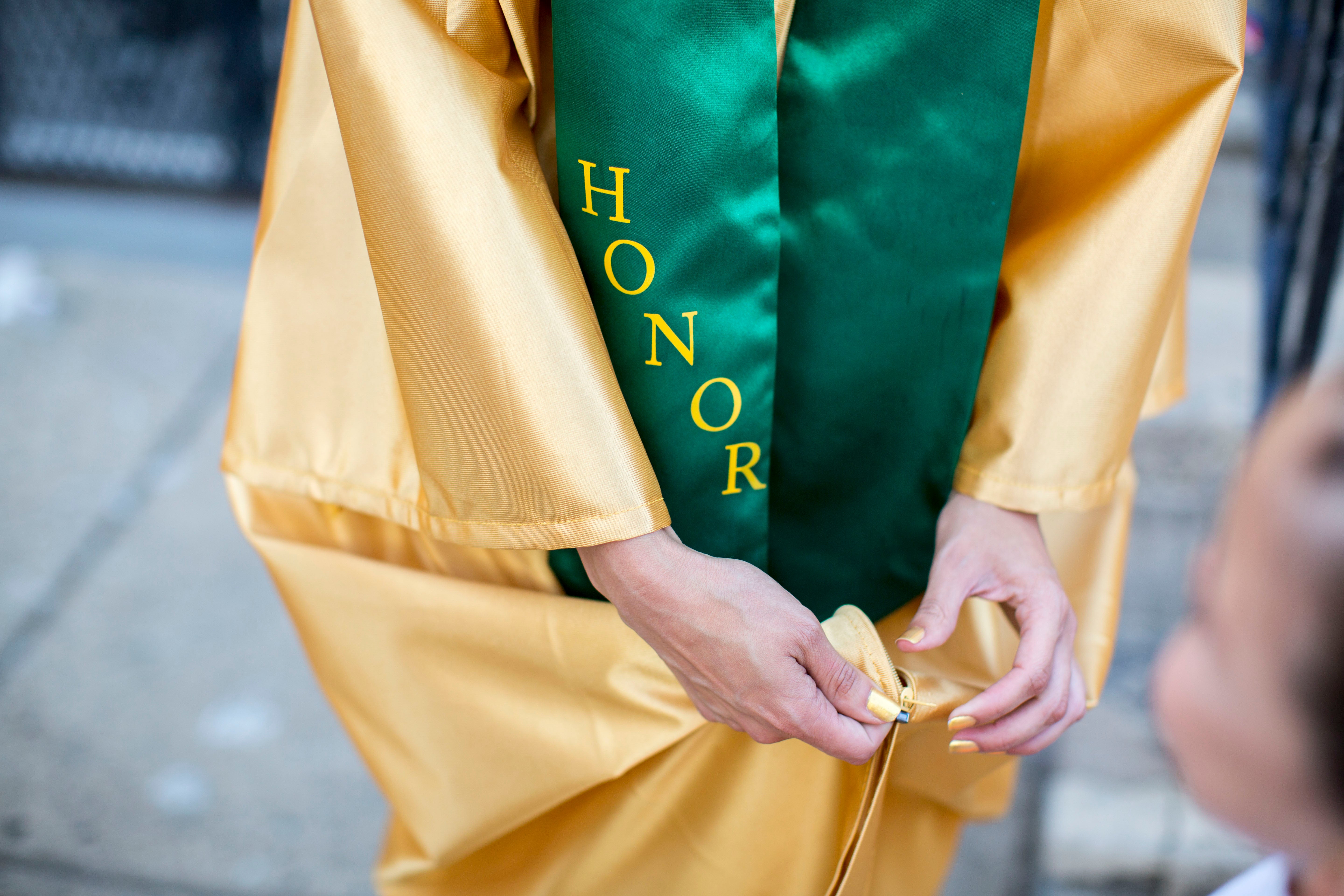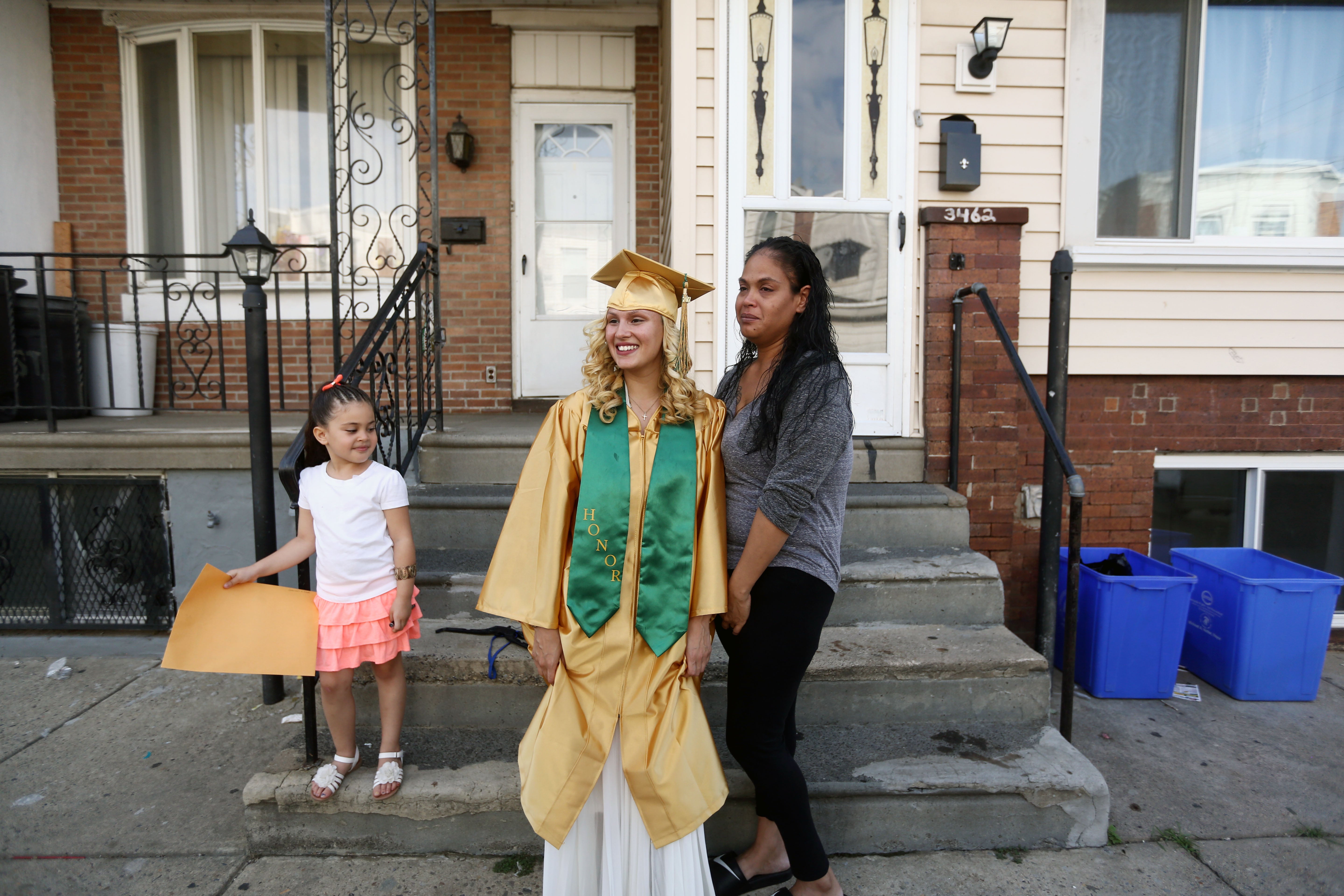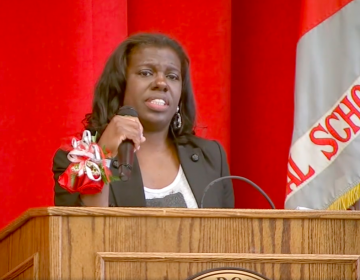Don’t call it the Badlands: The story of Savannah Zayas
It’s early February, and Savannah Zayas is just four months away from proving the world wrong.
When she became pregnant in middle school at age 14, the odds of her making it to and finishing high school were long — especially so coming from Kensington, a poverty-stricken neighborhood in North Philadelphia.
And though many people let her know it — shamed her, pitied her, tried to pigeonhole her — a steady flame lit from within.
“I tell myself every morning, ‘Savannah, your life is gonna be different. You’re going to have a good life. You’re going to live a life where you don’t have to depend on different people every day to get you what you need,’” she said
Six years after getting pregnant, Savannah has exceeded expectations.
She’s a senior at North Philly’s Thomas A. Edison High School, where she’s a member of the National Honor Society. After school, she works at a local non-profit helping younger students with their homework. And on top of being a mother, she helps run the household for her own mom and her two younger siblings.
And while she carries her burdens with grace, they can also overwhelm her. Her day-to-day life is hectic. Her past is a cross to bear. And sometimes, like here in February, she feels on the verge of giving up.
“I feel like I’m running down a hallway,” she said, “and I’m never going to reach the door.”
Savannah’s struggles aren’t unique. They’re all too common for many students who live in neighborhoods of deep poverty.
What’s unique is Savannah — her wisdom, her resilience, and her openness to sharing insights that give us a better understanding of the staggering needs at our most challenged schools.
Savannah’s story — based on more than a year of interviews with her, her family members, her teachers and her mentors — can also be experienced as a radio documentary. Her tale is told across the first three episodes of the new Keystone Crossroads’ podcast “Schooled.”
Listen to “Schooled” on Apple Podcasts or Stitcher
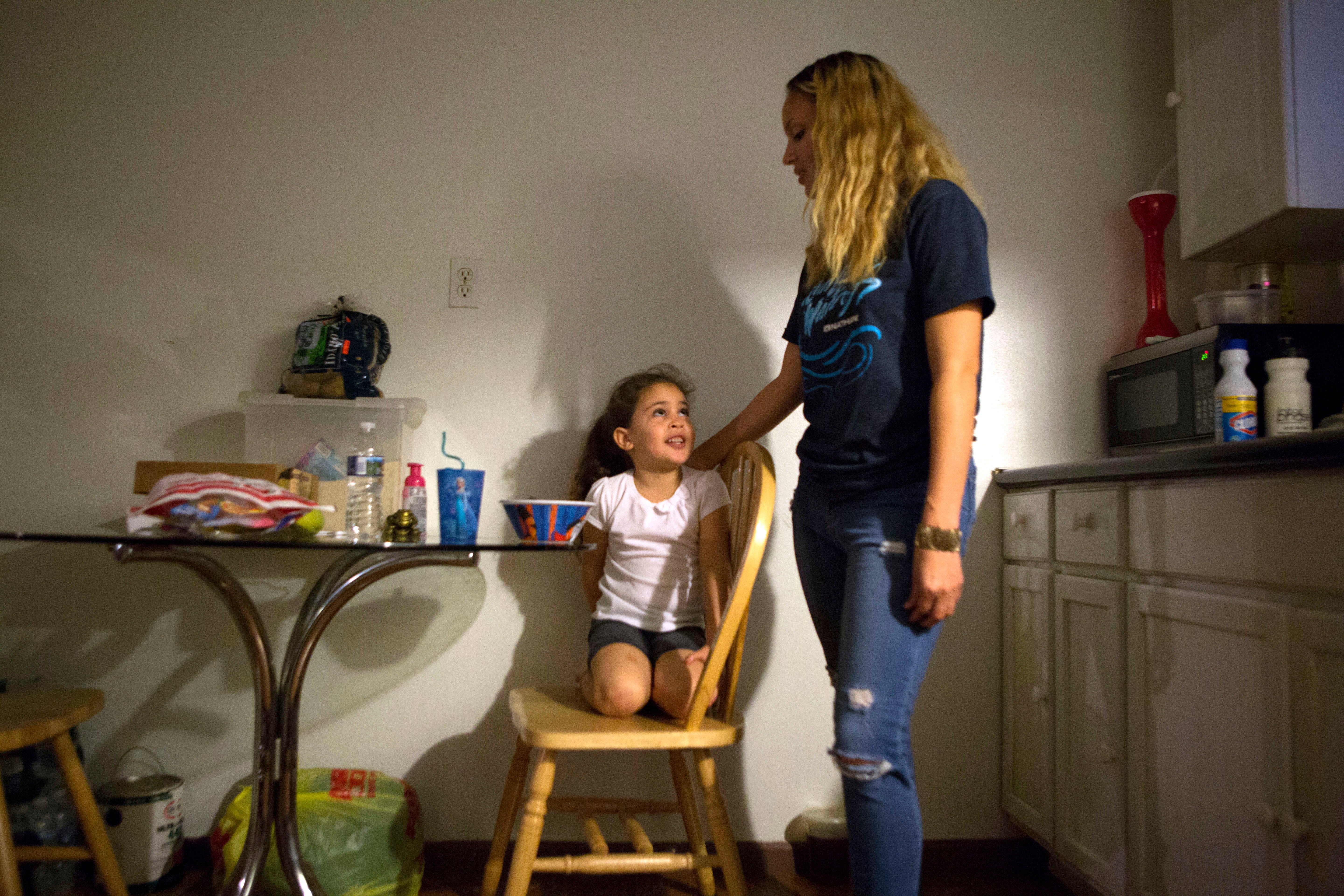
A fighter since birth
It’s a cool November evening. Savannah, 19, her hair blonde at the edges, but dark at the roots, stands on the front steps of her family’s rowhome. Cars motor past blaring pop music. Savannah shouts a ‘Hi’ to a neighbor across the way. Someone leans against the wall of the corner store smoking a cigarette.
It’s a neighborhood where median household income is $24,000 a year, a place infamous for open-air drug use, gang activity, and violent crime.
“Once it’s dark, no one is out the house,” she said. “It’s either: school or home. And for me it’s school, work, and home.”
Savannah admits this isn’t the mindset of some of her friends.
“I have a lot of bad friends,” she said. “I do. But I don’t hang with them. Like, we’ll be in school, we’ll talk — that’s school.”
What’s “bad?” I ask her.
“As in, like, hustling, smoking and partying,” she said. “I don’t do those things.”
Savannah says the difference is her daughter, Layla. So while some of her classmates take to the streets at night, she’s inside — doing homework, playing with puzzles, trying to create a safe haven.
Nationally, the success rate for teen mothers is grim. Most don’t finish high school and fewer than two percent finish college by age 30. And the children of teen mothers face steep odds too, with greater likelihood of being ill-prepared for kindergarten and ultimately dropping out of school.
Here, Savannah’s burden is doubled, as she, herself, is the daughter of a teen mother who dropped out of high school. Savannah, though, aims not only to graduate, but to go to college. At the same time, she’s as vigilant about her daughter’s academic development as she is about her own. She reads to Layla every night and keeps a journal tracking how her abilities grow over time.
The teachers at Layla’s pre-school have noticed.
“They kind of, like, give me props and I get embarrassed sometimes,” she said.
This success is no accident. Since she delivered Layla at 15, she’s been on a mission to will herself and her daughter out of poverty — statistics be damned.
“I don’t care how hard it will be, I’m going to do it. I’m going to push myself because I know I want better for me and my child,” she said. “I’d rather work hard than struggle my whole life.”
She knows that 15 year olds aren’t usually so thoughtful and mature.
“I had to grow up really fast,” she said.
To truly understand just how difficult it’s been for Savannah to get to where she is today, you need to start all the way back at the beginning — actually, even before she was even born.
Savannah’s mother, Neverlyn Vargas, was already six months along before she realized she was pregnant with Savannah. She was 16 years old, living not far from where the family lives today.
“When I did find out, I didn’t really want her,” said Neverlyn. “I wasn’t ready.”
Neverlyn, 36, has jet black hair and speaks about the past in a weathered voice. A low boil of emotion bubbles beneath the surface, her eyes sometimes glazing with tears.
She was habitually using PCP at the time, and was hoping that the drug would terminate the pregnancy.
“I figured that me keeping smoking would end up killing her,” she said. “But it didn’t.”
When Neverlyn’s mom found out about the pregnancy, she made her go to the doctor.
“And when they did the ultrasound, they saw that the umbilical cord was wrapped around her neck,” said Neverlyn. “So I went in for an early c-section.”
There were severe complications during the procedure and both lives were at risk. Neverlyn was technically dead for more than twenty minutes. But, in the end, both survived.
Savannah was born January 17th, 1997 — two months premature.
“I’ve been a fighter since birth,” said Savannah. “Four pounds, four ounces.”
Savannah’s father, Joshua Zayas, was 21 at the time. And for the first few years of her life, he sold drugs on the corners, and was frequently in jail.
“He wasn’t there for her first birthday,” said Neverlyn. “He wasn’t there for her second. He came out for her third. He was just in and out all the time.”
Neverlyn had another two children with him, giving Savannah a younger brother and a baby sister. They all lived in a rented house in Kensington, and from Savannah’s perspective, they were sunny days. She thought of herself as a ‘daddy’s girl’ — the oldest kid in what seemed to her a happy family.
But that vision quickly changed as she came to understand more of what was actually happening in that house.
“I was going up the stairs…and I see him like hiding in the corner in the closet with this pipe thing,” said Savannah. “And it was clear and it was black. It looked like it was burnt.”
Savannah was five. Her mom later told her her it was a crack pipe.
“I told my mom that, and then my mom came and approached him,” she said. “And that was the first time I remember my dad being locked up, because he smacked me across my face when my mom had left to go to work.”
Savannah says he hit her so hard he left his handprint on her face. After he was released, though, Neverlyn took him back in.
The abuse became horrifically worse.
Savannah says it began when he would touch her inappropriately while her mother wasn’t around. From there, the abuse escalated. Court records detail brutal accounts of the six-year old suffering multiple rapes at the hands of her father.
“My father threatened to kill my mom if I said anything,” said Savannah, struggling to speak through tears.
She says he also silenced her with force.
“He beat me so hard with those belts that have a lot of holes in them. I was, like, bruised, and like you could see the holes on my legs. It was so painful, I couldn’t sit down,” she said.
Savannah kept quiet for a while. But when she realized her dad was also raping her then four-year-old brother, Joshua Jr., she decided to speak out.
“My brother came to me and he’s like, ‘Is poppy hurting you too?’ I’m like, ‘What? What are you talking about? What do you mean?’ ‘Like, daddy’s hurting me.’ And he started crying and crying and crying, like, ‘Daddy hurts me, daddy hurts me.’ And I’m like, ‘Joshua, what are you talking about? Where?’ And he, like, showed me on his diaper, ‘There, there. That’s where it hurts.’ And I was like — you know what — six years old, I felt like I needed to take charge. I needed to tell my mom.”
Neverlyn called the police and Savannah’s father was arrested.
That was 2004.
“After that I went crazy because I didn’t believe he would do something like that to his own kids,” said Neverlyn.
Neverlyn moved the family to stay with relatives in Ohio for a while, just to get away.
“And when we moved far away and then like, you know, my aunts and everyone had to explain to me, like, ‘You know, what he did was wrong. Even though he told you, ‘It was OK, it was OK.’ It was wrong,’” she said.
Then came a years-long legal ordeal that was excruciating for Savannah. She endured seemingly endless police interrogations and court appearances reliving the trauma — an overwhelming amount for a young child to process.
In 2006, Joshua Zayas Sr., who also uses the name Raymond, was found guilty of rape, incest, the corruption of minors, and endangering the welfare of a child. He was sentenced to 31 to 62 years in prison and is currently serving his term at a state prison in Western Pennsylvania.
He’s fought the verdict multiple times over the years, and the repeated appeals have added to Savannah’s misery.
“I remember when I turned 12, I had enough,” she said. “I literally sat in front of the judge [and said], ‘I want you guys to stop making me repeat myself. Every time I repeat myself, it triggers memories and I hate it.’ So I guess that’s when they, like, ‘You know what? They had enough, like they had enough torture.’ Because that’s what it was. I feel like every time we went to the court, it was torture.”
Neverlyn and the family eventually left Ohio and resettled just outside of Philadelphia in Lower Bucks County. She was able to keep the family afloat by working multiple jobs — cleaning houses, waitressing, attending a laundromat.
This often left Savannah at home in charge of Joshua Jr. and her sister, Jaileah.
“She, like, raised me and my little sister for a long time,” said Josh. “We, like, barely saw our mom. After school we saw her, and then right before we went to bed, she’d go out to work again.”

It’s a time Savannah remembers fondly for the peace and stability of the outside environment, but inside her own mind, the abuse haunted her. She felt anxious and jumpy around strangers. If she came across a man whose features resembled her father’s, she would burst into tears.
“I was really, really, really afraid,” Savannah said. “I didn’t want to come out. I just wanted to stay home.”
She started dressing in darker clothes and became more inward, antisocial, pushing people away.
“I used to feel ashamed and dirty because I thought it was my fault because I let it happen. And that used to just be stuck in my head,” she said.
Savannah began therapy, and talking and writing about her feelings helped immensely. So did her faith. She says a turning point came when she began meeting with other women who had been victims of sexual abuse. One of the women in particular impressed Savannah in her ability to build a successful life from the ashes of her trauma.
“She told me, ‘You take it day by day, and just try not to think of it.’ I thought about it, like, if I beat myself up for it, I’m not going to get far. I’m going to just hurt my health,” said Savannah. “And I thought, ‘God is going to help you through this. He’s going to make you stronger.’ And I just started to feel better.”
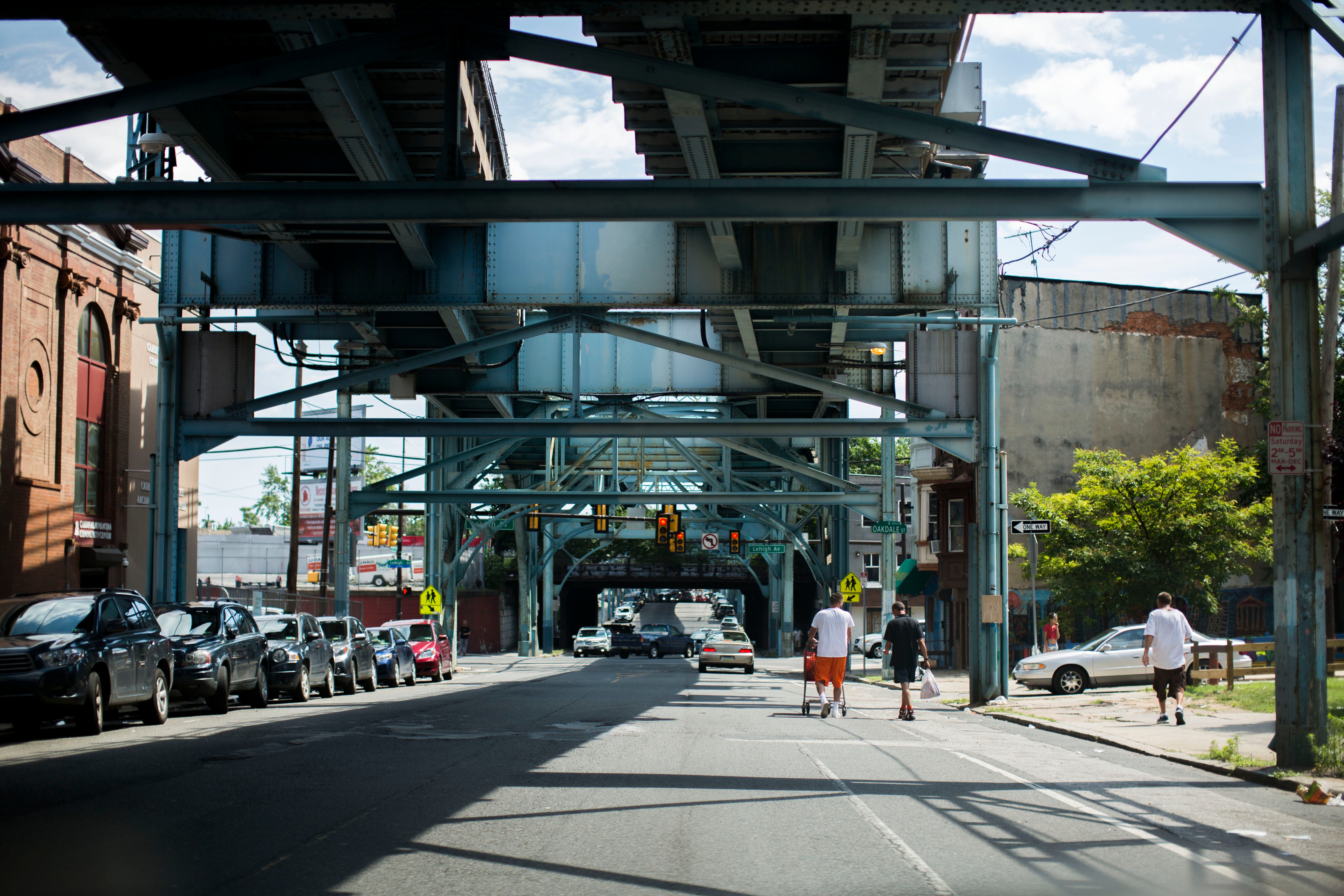
The cycle continues
Savannah’s time in the suburbs didn’t last long. When she was twelve, Neverlyn developed severe kidney problems that pushed her to stop working.
She moved the family back to Kensington, where they bounced around with relatives for a while before renting a two-story rowhome in earshot of the rumbling Market-Frankford El train. The house sits near one of the most notorious markets for heroin and prostitution in the country, directly facing McPherson Square, known locally as “Needle Park.”
“I never understood why there were so many people constantly here,” Savannah said, looking at the street along the park. “And now I know: because they’re drug addicts. And it’s because they do drugs. And it’s so crazy because I see so many pretty girls, and I just look at them, and I just, like, I literally sometimes I tell them, ‘Why are you wasting your life?’”
Savannah had gotten used to life outside the city, and it’s an understatement to say the transition was a culture shock. She was a vulnerable kid, still processing her abuse as she was coming into teenhood — and then just dropped in a completely different world.
“Two houses down, the house burned down because of crackheads,” she said. “People used to make dogs fight. And I never knew people would do that. They used to make pitbulls fight, and I seen this one time that these dogs just made this other dog bleed so bad, and they just didn’t want to stop.”
And it was in this context that, at age 13, she was introduced to Miguel, the soon-to-be the father of her child.
At this point in the story it must be said: Savannah’s relationship with her mother is very complicated. In ways, she respects her — praises her for emphasizing the importance of school, and for at one point being a tireless breadwinner for the family.
“That’s my queen,” Savannah told me during one of our first interviews.
But she has also questioned a lot of Neverlyn’s judgements over the years, and — in raising her own daughter — actively uses her as an example of what not to do.
It was Neverlyn who introduced her to Miguel, a 17-year-old who lived with his aunt a few houses up the block. He had left school after fifth grade.
“I met him because my mom was just like, ‘Miguel, this is my daughter. Savannah, this is Miguel.’ So my mom allowed me to have that, I guess, my first boyfriend,” Savannah said.
The summer between 6th and 7th grade, when Savannah was 14, she approached her mom about sex.
“I got curious, and she told me, ‘That’s your decision. And decisions you make, you will pay for them,’” said Savannah. “And my mom gave me two condoms and told me, ‘Whatever happens after this is your responsibility.’”
“She came,” said Neverlyn, “and she told me, ‘Mom, I’m ready.’ I’m like, ‘look.’ I sat down with both of them, I said, ‘These are the condoms. I mean this is not something you should be doing, but if you’re ready — even if I tell you not to do it, you’re going to do it anyway.’”
Savannah gave the condoms to Miguel.
“I didn’t even want to do it. I was just curious. And I gave it to him. I turned off the lights, and I told him, like, ‘I want to try, but as soon as I tell you to stop, stop.’ And he didn’t use a condom. And I trusted him,” Savannah said as she looked at the house where it happened. “And I turned on the lights afterwards — because it didn’t really go on for much — and I turned on the lights afterwards, and I saw the condom still wrapped on the floor. And I just cried.”
Savannah says that was the first and only time they had sex. A few days later he was arrested on drug charges, and shortly after, while he was locked up, she found out she was pregnant.
She felt awful about it at first, and in part blamed Neverlyn.
“And I looked at my mom, and I hated her,” Savannah said. “I told her, I’m like, ‘You set me up with a guy that has no life.’”
“I thought this was a guy that finished high school. I thought this was a guy that was so-called working to go to college. I thought wrong,” she said. “It was all lies.”
For her 7th grade year, Savannah attended John B. Stetson Middle School, which is run by the charter school organization Aspira. English and social studies teacher Gianni Lafratta vividly recalls the day he met her.
“First day of school meeting Savannah was, ‘Hi Mr. Lafratta, my name is Savannah and I’m pregnant.’ And in the moment it was like, smile and make sure she feels welcome, but, wow, what is this child going to go through?” said Lafratta. “It’s already rough enough as it is being a kid in today’s world, and add Kensington to it, and now a pregnancy on top…But you could see that this was a child who wasn’t going to stop, that there was nothing going to hold her back.”
As Savannah began to show signs of pregnancy, though, she was tested. Many people made it known that they thought she shouldn’t keep the baby.
“I used to always hear so many negative things, just like walking in the streets,” said Savannah. “I didn’t care. I’m like, ‘I don’t care what anybody says, that’s what I wanted.’ And I felt like without it, I wasn’t going to be anything.”
Much of Savannah’s stress came from her mother. Neverlyn pictured an unending loop of poverty, her daughter doomed to a life of dependency and sorrow. She urged Savannah to have an abortion.
“Because she was young, and people was going to talk crap about her,” said Neverlyn. “I couldn’t even take care of my kids. I was on Section 8. I didn’t want to bring her into that, because the cycle is continuing. She had a baby basically by a drug dealer the same way I did.”
But this is a crucial difference between them: where Neverlyn saw her own teen pregnancy as limiting, Savannah became buoyed by the thought of taking on the responsibility. It gave her purpose, filled her with hope.
“She was thinking, like, I was going to be in the streets. I was going to be doing drugs. I was going to be drinking. I was going to be a girl with all these different men, with all these kids by different men,” said Savannah. “That’s what she sees all the other girls doing…and by me having Layla, I wanted to show her that I wasn’t going to do that.”
The two were at loggerheads. Tension in the house built, and arguments sometimes turned physical. At five months pregnant, Savannah left her mother to move in with her grandparents.
“I was just like, ‘I need to leave. I need to move. I want to go.’ And she’s like, ‘Alright, if you want to go, go.’ My mom helped me pack my bags that day,” said Savannah. “She sat my stuff outside, closed the door and my grandmom came and got me.”
During this tumultuous time, Savannah says Lafratta’s class was a bedrock — even if he didn’t know the full story at home.
“It was always a matter of supporting her, keeping her grounded, and making her realize, ‘Yeah, you’re pregnant. It’s going to be a struggle, but you can do it,’” Lafratta said. “And she — I think because of the pregnancy, and those people — it was more of, ‘I’m going to prove you wrong.’”

In the course of the first few months of school, Lafratta and his wife learned they were to have a child. And Savannah remembers him urging her to learn as much as she could about motherhood before having the baby. After that, Stetson’s school library became Savannah’s oasis.
“I would go to the library in school, and I would get tons and tons of books and I would just read,” she said, “because no one taught me how to be the way that I am with my daughter. I had to teach myself.”
Layla, who’s birth name is Navialis Layla Zayas, was born February 28th, 2012, a day that forever altered the fabric of Savannah’s being.
“She made me see life differently. She made me see, like how a flower grows: it’s patience, time and love. In those nine months and then having her, it was like a flower just bloomed,” said Savannah. “She made me see, like, life is happy. Life is good. You just need to be patient and wait for what’s coming for you.”
Savannah was able to finish 7th grade at Stetson, but didn’t feel like finishing middle school there would be feasible. So for 8th grade she enrolled in a cyber charter school, where she was able to do coursework online. It was a period of extreme focus for Savannah, where she very intentionally committed herself to making a better life.
But it also was an admittedly lonely, depressing time. She was a single mother confined indoors all day with a newborn — isolated from her classmates, lacking a support system. Savannah lost so much weight post-partum that her doctors began to worry.
“The doctors were like, ‘This is very unhealthy for your age. What are you doing? What’s going on?’ And I just told them, ‘I stay home, take care of my daughter and I do school online.’ And they were telling me I needed to be active, that I needed to be social,” she said.
Savannah had been planning to enroll in a cyber program for high school as well, but her grandmother interceded.
“‘I want you to socialize, socialize with kids. I want you to be active,’ Savannah recalls her grandmother telling her. ‘I want you to be a kid, and I don’t want you to have to be so mature and serious all the time.’ And I remember my grandma always crying to me, telling me that, but that’s all I knew. All I knew was to stick to myself.”
And this is the Savannah Zayas who showed up at Edison High School in September of 2013: strong, smart and determined, but also extremely vulnerable, overburdened, and in need of a great deal of care.
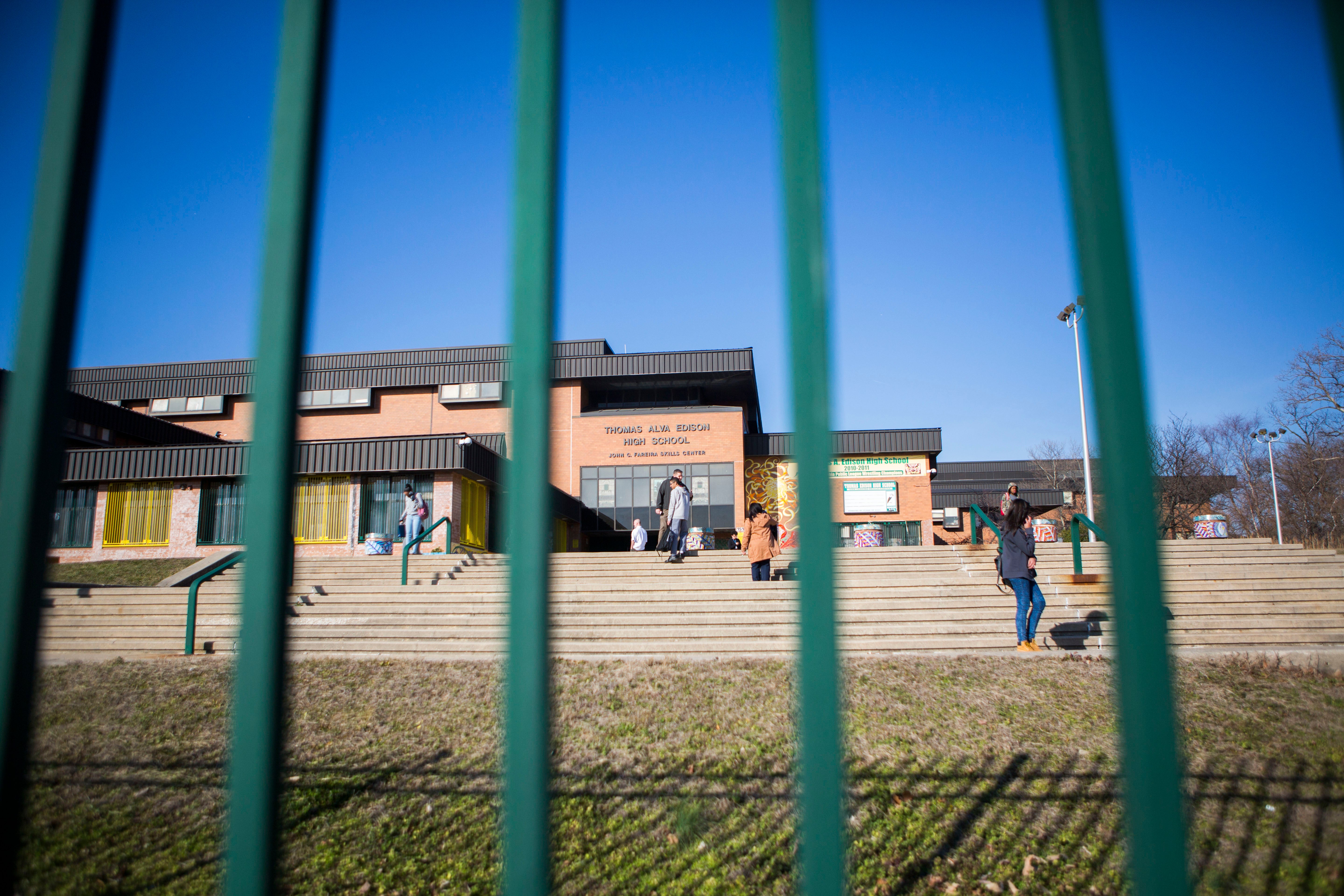
The odds
The odds say Savannah won’t graduate high school. They say that a teen mom living in poverty has little chance to make it through college. And they say Savannah’s daughter, Layla, is doomed to show up to kindergarten lagging behind her classmates.
Savannah came to Edison High School defiantly saying otherwise.
“I know if I surround myself with positivity and just keep looking forward, I can do it,” she said. “I’m going to be able to do it.”
The odds are the odds, though, for a reason. They’re often right.
They were about Savannah’s mother, Neverlyn. She attended Edison — the very same high school — in the late 1990s, but dropped out just before she had Savannah at age 16.
“That’s something that I always told her, ‘Just don’t drop out of school. You’ve gotta finish it. Because if you drop out, you’re going to be sitting home just like me on a welfare check, and it’s not fun,’” said Neverlyn.
To succeed at Edison, Savannah hoped to find a community that would lift her up and challenge her academically — a school system ready and able to serve students who’ve known immense trauma.
And in some classrooms, she found that, with teachers willing and committed. But the school itself too often became just another burden to bear — a reflection of the chaotic world outside.
“High school down here is a struggle,” said Savannah. “You have to force yourself to do things. You have to, like, ‘Come on, let’s go to class. Come on, let’s not get caught in other people’s situations,’ such as fighting. That happened to me today. There was a big fight in the hallway. And I had to, like, ‘Excuse me, I have to go to class.’ That’s a struggle every — not every day, but often. That’s a struggle.”
This was the conversation Savannah and I had the first time we met, in May 2016, late in her junior year.
The year was particularly tumultuous. The School District of Philadelphia outsourced its staffing service to an untested, private firm, a decision that caused disarray in many city schools. Across the district a high number of vacant positions went unfilled and substitute teachers showed up a very low percent of the time.
Edison was among the schools most negatively affected. In the first half of the year, there were as many as 10 unfilled vacant positions and daily substitutes were found only for 10 percent of the needed coverage.
According to interviews with several teachers and students, this meant many academic hours were wasted, and students often wandered the halls, sometimes causing mayhem. According to school district data, Edison had among the highest rates in the city that year for reported assaults.
“That was a bad fight. It was two boys, and I don’t know what they’re fighting about,” said Savannah. “Like pounding in the face at each other, blood, like, bad. That gets me frustrated, ‘cause it just makes me feel, like, ‘Why do I need to try so hard, when I feel like everything else is like falling apart?’”
In the modern era of public schools, urban neighborhood high schools like Edison face the greatest challenges.
Implicitly, that’s actually the very design of the system.
First, subtract every family that opts for private school or moves out of the city for a suburban school district.
Then take out all the kids who stay in the city, but are accepted into selective magnet and specialty public schools.
And then take away the kids accepted by lottery-based charter schools.
And what do you have left?
Schools left to serve a student body so concentrated with need it’s almost hard to fathom.
“This is the hardest job,” said Marie Woodward, who taught Savannah during her sophomore and junior year at Edison. “I tell my husband it’s like working in an emergency room, because you’re constantly triaging children who are behind, who’ve been hurt, who are emotionally unwell, who are physically unwell, and the goal is to get them educated and to prepare them for either work or college or both. And sometimes that seems like a really impossible job.”
The problems at Edison are complex and the results are distressing. Scores on state tests are dismal, and about half of the students who start there don’t graduate within four years.
The role of public policy in shaping what happens inside, though, can’t be ignored.
Pennsylvania has a highly inequitable system for funding schools — almost entirely devoid of any attempt to match dollars with student need.
According to its own formula, state government considers Philadelphia one of its most burdened school districts, but, per pupil, less money is ultimately spent on students in Philly compared to most of the other students in the commonwealth.
At Edison, this means the baseline is always out-of-whack. Really deep student need is met with a bare-bones staff, and overburdened administrators and counselors.
“That’s a really big school with a very, very small staff, and it’s hard to combat all of the problems of the world with just a handful of people,” said Woodward.
If you look at the money the district actually spends inside Edison, after deducting centralized overhead costs, it works out to about $7,400 per student.
To put that in perspective, the state spends more than five times that on each of the inmates in its prisons.
That’s $7,400 per year for Savannah. And $41,000 per year for her father, a convicted child rapist.
Inmates, of course, cost more because they receive year-round, 24/7 services. High school students in Pennsylvania are required to receive 990 hours of instruction per year. Education advocates believe that investing more to increase the quality and arguably the number of those hours will go a long way in reducing the school-to-prison pipeline.
According to the Pennsylvania Department of Corrections, the average inmate in its prisons reads at an eighth grade level, and more than a quarter of the population didn’t complete high school.
The School District of Philadelphia also plays its part in creating inequities. It doesn’t utilize a need-based formula for distributing money to its schools. And over the years, in order to give students more options, it prioritized creating more specialty public and charter high schools, which require families to navigate an admissions process.
These schools have been very positive for some families, but there’s a ying to the yang.
Neighborhood high schools like Edison have increasingly become places of last resort, serving significantly higher percentages of students with immense academic and emotional needs.
In Savannah’s case, as a teen mom coming from an often unstable home life, a whole host of logistical barriers kept the city’s other high school offerings from being viable options.
A 2015 study found that Philadelphia’s 19 district-run neighborhood high schools serve far more students who’ve been in the child welfare system, who have special education disabilities and who are learning English.
And as the needs at the district’s neighborhood high schools have grown, the support for the roughly 20,000 students who attend them have been undercut.
As Savannah entered Edison, a “doomsday” budget pushed the district to shed thousands of positions, leaving schools with larger class sizes and fewer guidance counselors, nurses and assistant principals.
Staffers citywide say this led to lower morale among educators and then chronic teacher and principal turnover — all of which means a lack of dependability and continuity for the students who need it most.
“It just becomes really difficult for the kids more than anybody. Teachers get stressed, yeah, definitely, but the kids get stressed too because they don’t know who they can rely on,” said Sydney Coffin, who teaches English and poetry at Edison.
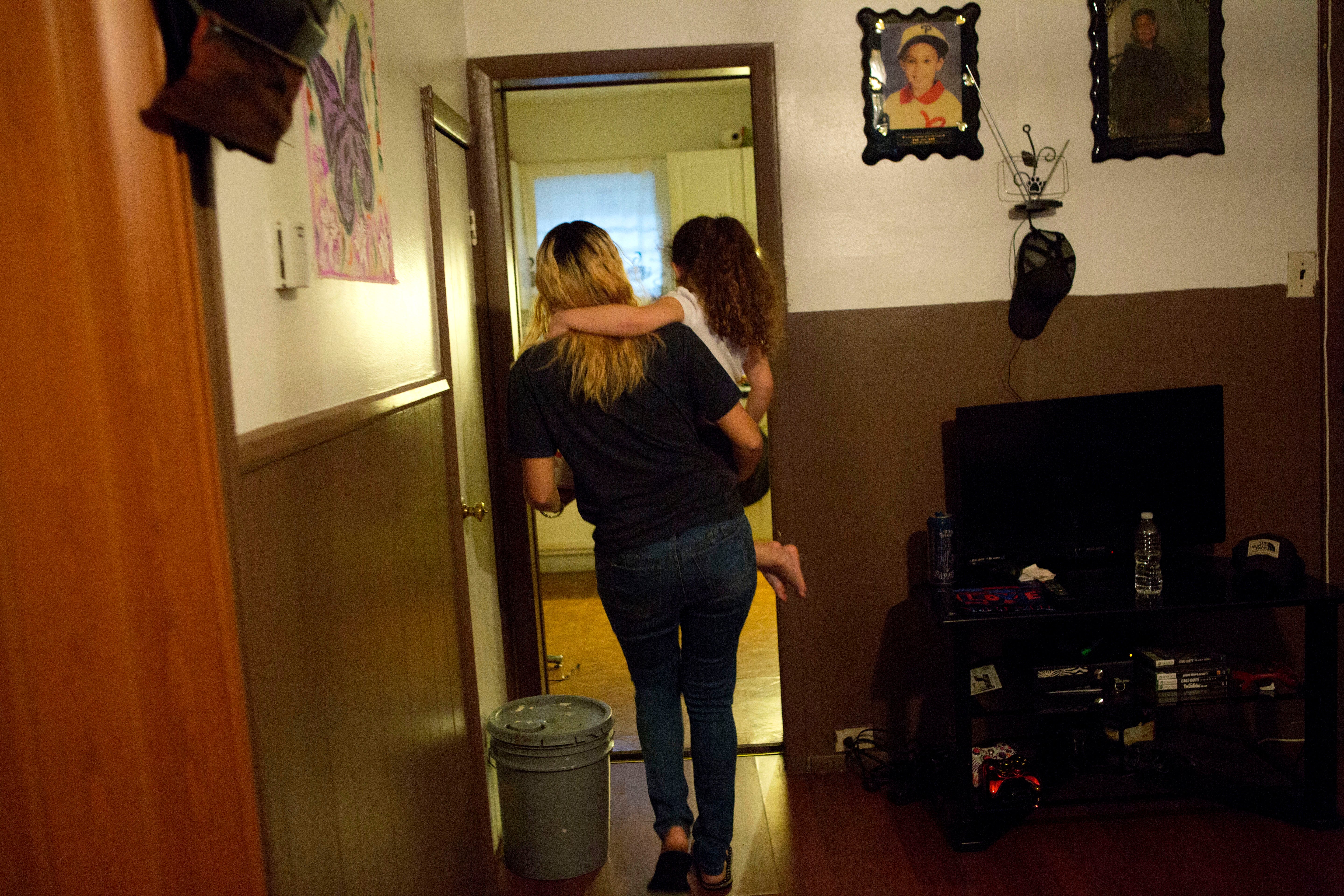
Searching for support
Savannah’s home life during her first few years of high school continued to be as trying as ever.
Her mother began a relationship with a man she had known from the neighborhood who was locked up in a state prison. Neverlyn was then arrested for attempting to smuggle drugs inside — a felony offense.
“It was intent to deliver and intent to distribute,” said Neverlyn, who dons a tattoo of her boyfriend’s name on her chest.
For parts of Savannah’s freshman and sophomore year, Neverlyn was in jail on the other side of the state. Savannah’s siblings moved in with her at their grandparents’ place, and Savannah had little choice but to shoulder the added responsibility.
“Even though I was, like, what? 16? I was 16. My daughter probably was like one, two? So I had my daughter, I had my brother and I had my sister. So it felt like all over again I had to take care of them. But I didn’t mind it,” said Savannah. “I’m, like, ‘I got this.’”
In the meantime, Savannah entered a relationship with a man more than 20 years older. If authorities had known, he could have been charged with corrupting a minor.
“He was kind of like my main support. When I didn’t have anything, like, if I didn’t have money or I needed transportation or I wanted to go places, he’s always the one that always did for me, like, did for me and my daughter,” said Savannah.
But he became increasingly controlling as time went on, and Savannah faced a paradox. The older man provided badly needed short-term support. But he also threatened Savannah’s long term goals, as he actively tried to dissuade her from planning for college or career.
“It was just too much jealousy, and then I always had to be inside the house; I couldn’t come outside. I couldn’t have friends. I couldn’t have social media,” she said. “He just didn’t agree to the things that I agreed to, about like going to college, like, just working, and the things that I wanted. And he just didn’t care, and was just so egocentric.”
Through all of this, Savannah’s only constant was Layla.
“If I was having a bad day, I would literally, like, talk to my one year old, like, ‘You can’t believe the day I had today,’ she said. “And even though she was little, I knew she understood me. And, like, now if I’m having a bad day, I’ll go home and she’ll give me hug, like, ‘Mommy, it’s ok, do you want to talk about it?’”
It was Layla who gave her strength. Layla who gave her energy. It’s Layla, still, who keeps her focused on visualizing a better future, who keeps her optimistic and open.
And so — despite all the negativity in her life, all the hurt she’s endured, all the times she’s been taken advantage of — Savannah resists the urge to harden. And when she comes across people who earnestly try to help her, who offer her attention and compassion, she soaks in their care like a sponge.
And that’s what happened with Mrs. Woodward.
“There wasn’t a day that I did not want to go to that class,” said Savannah. “Like every day, I was hoping like, ‘I can’t wait to go there. I can’t wait to go there.’”
In spaces where she feels safe and valued, Savannah is her best self: outgoing, empathetic, dynamic.
“Classrooms don’t run without students like Savannah, who take the lead and help take ownership for the whole class,” said Woodward. “For instance, Angel. Angel would come in off track. Angel is hilarious. He’s a jokester. And she would say, ‘Alright, Angel, get your binder out. Get your pen or pencil. Here’s what we’re doing. You need to get with this.’ And he would do it. He would follow her lead.”

The relationships that Woodward built at Edison — not only with Savannah, but with many other students — speak to a truth not often mentioned in political conversations about public education. For many students, the most important thing that happens in a day of school is being shown love.
“There’s so much negativity in so many schools, I think just because of the environment, and it comes into the building, and I think teachers get grumpy because they feel like they’re trying to fight a battle that they can’t win. Kids are grumpy because they feel the same way at home. And then when they come to school, it’s not a safe haven,” she said. “They come to school expecting to be treated with love and dignity and respect, and that’s not always what they’re getting…I have a student here who comes in and gives me a hug every day. He puts his head on my shoulder. He doesn’t have a mom. And I think that’s what’s going on, and he just wants to feel like I’m his mom. And it’s a little bit troublesome, I think, the relationship that we have. It’s a little bit awkward. It makes me a little bit uncomfortable, but I understand he has a really deep need because he misses his mother.”
This speaks to a larger question that’s been debated for decades: To what extent can schools really help the most disadvantaged kids overcome the immense hurdles that they have in their home lives? Savannah herself is somewhat of a skeptic. Looking around her neighborhood, seeing the crippling effects of poverty, she fears that no amount of school supports or resources will help children whose parents don’t live up to their role.
I was giving Savannah a ride home one night after an interview, and about a block from her house we approached two very young children in the middle of the street. It was after dark and no adults were nearby. “These are the things that I don’t get,” Savannah said, audibly frustrated. “I see no parents. And it’s just crazy because then they get hit and end up on the news, but it’s your fault because you weren’t watching them.”
In many ways, though, Savannah, herself, is a testament to the immense power of schools. When she’s been at her lowest, her relationships with teachers have been absolutely crucial lifelines. And if supports at Edison were anywhere near what they are in better-resourced schools, Savannah’s the kind of student who would jump at the opportunity to take advantage of more.
If spent well, more funding at Edison could go very far, but it’s an oversimplification to think that all of the school’s problems would be solved by adding money.
Take, for instance, teacher turnover. It can be driven by the fact that pay is higher in cushier, suburban districts. In Pennsylvania, where school funding is highly reliant on local property taxes, teachers who work in the wealthiest fifth of districts earn an average of $16,000 more per year than teachers in the poorest fifth of districts, which includes Philadelphia.
But there’s often more to turnover than simple dollars and cents, and Woodward’s experience speaks to this.
“There’s a lot of red tape and I think that a lot of people have really good hearts in the school district,” she said, “but the red tape prohibits them to make the kind of decisions that they want to make.”
Woodward left Edison midway through Savannah’s junior year. She was frustrated with the school district’s bureaucracy and the rigidity of the teachers’ union. She didn’t feel like she was getting the support she needed to grow as a teacher, so she took a job in the next neighborhood over at Olney Charter High School.
It was a tough decision for Woodward, but she says the move has been positive. For Savannah, though, it felt like the wind was knocked out of her. She actually testified about this at a Philadelphia City Council hearing last year.
“I used to know my source of support, her name was Mrs. Woodward. She motivated me to keep striving even though the moments — this is very emotional — even though the moments sometimes got hard,” Savannah said, choking back tears.Savannah came to City Hall to talk about the problems caused by teacher vacancies at Edison. After Woodward left, the class was overseen by a revolving door of fill-ins and long-term substitutes.
“I feel lost and I feel unmotivated,” she testified. “My grades, which had been very high, reflected that too.”Although Savannah has lived in Kensington for most of her life, many of her elementary school years were spent in the suburbs. And that experience, like a window into a foreign land, opened her to a perspective different from many of her peers at Edison.
She’s knows what a comparatively well-resourced, well-run school looks and feels like. And so when things go wrong at Edison — when the disparities become especially vivid — Savannah feels enraged by the inequality.
“I go to school to learn, and I was like, when she left, I just felt like I was going to school and it was just a waste of my time. I was going to school every day frustrated,” she said in an interview later. “I had to, like, calm myself down, because of the fact, like, I used to get angry with the substitutes. All the time I used to just come in like, ‘How are you a substitute, and you come into this class and you don’t even know what to teach us?’ I used to snap, like all my friends, I used to tell us: ‘What are we doing? Don’t you see that we’re just wasting time coming into this classroom every day? Not doing anything, not preparing us for SAT, not preparing us for college. We’re just doing nothing.”
Turnover also makes the job even harder for the educators who remain.

“It was very frustrating,” said Edison English teacher Sydney Coffin. “I took in a lot of the kids from her class. So I would have sixty kids sometimes in my room, because they just didn’t have a teacher, and then the teacher they got who filled in after her teacher had left was really incompetent.”
Then that replacement teacher left.
“There was nobody in there for them emotionally — even physically — for a period of time, and long enough that the kids were just wandering the halls,” said Coffin.
All of this coincided with a particularly tough time in Savannah’s personal life.
In December of her junior year, she found out she was pregnant again — with what would have been the older man’s child.
But there were severe medical issues, and doctors warned her that if she continued the pregnancy, the baby would likely die before term or suffer complications.
“I didn’t want to go through that. I didn’t want to push myself through being attached with a baby that’s not going to be mine anymore,” Savannah said. “And then, plus, like, I didn’t want to have that guy anymore, because I knew how he really was. I knew what I pictured myself — what I was going to go through if I had that baby. And I wasn’t going to do it. Both options were both going to be bad. I didn’t want to keep putting myself through a lot of bad abusive emotions. I just didn’t want to do it.”
Ending the pregnancy wasn’t a decision Savannah took lightly.
“I was crying for months. I couldn’t eat. It was a lot. I didn’t even want to go to school because, like, no one knew,” she said.
In Savannah’s house, positioned in the hall near the front door, there’s a table with pictures of deceased family members. In a frame sits the image of an early ultrasound.
“That’s was another struggle that I’m processing,” she said. “My mom’s been telling me to go to therapy for it, but I feel like I can manage it, but sometimes I don’t. It, like, hits me sometimes.”
This happened in January 2016, the week Savannah turned 19. Soon after, she stopped seeing the older man.
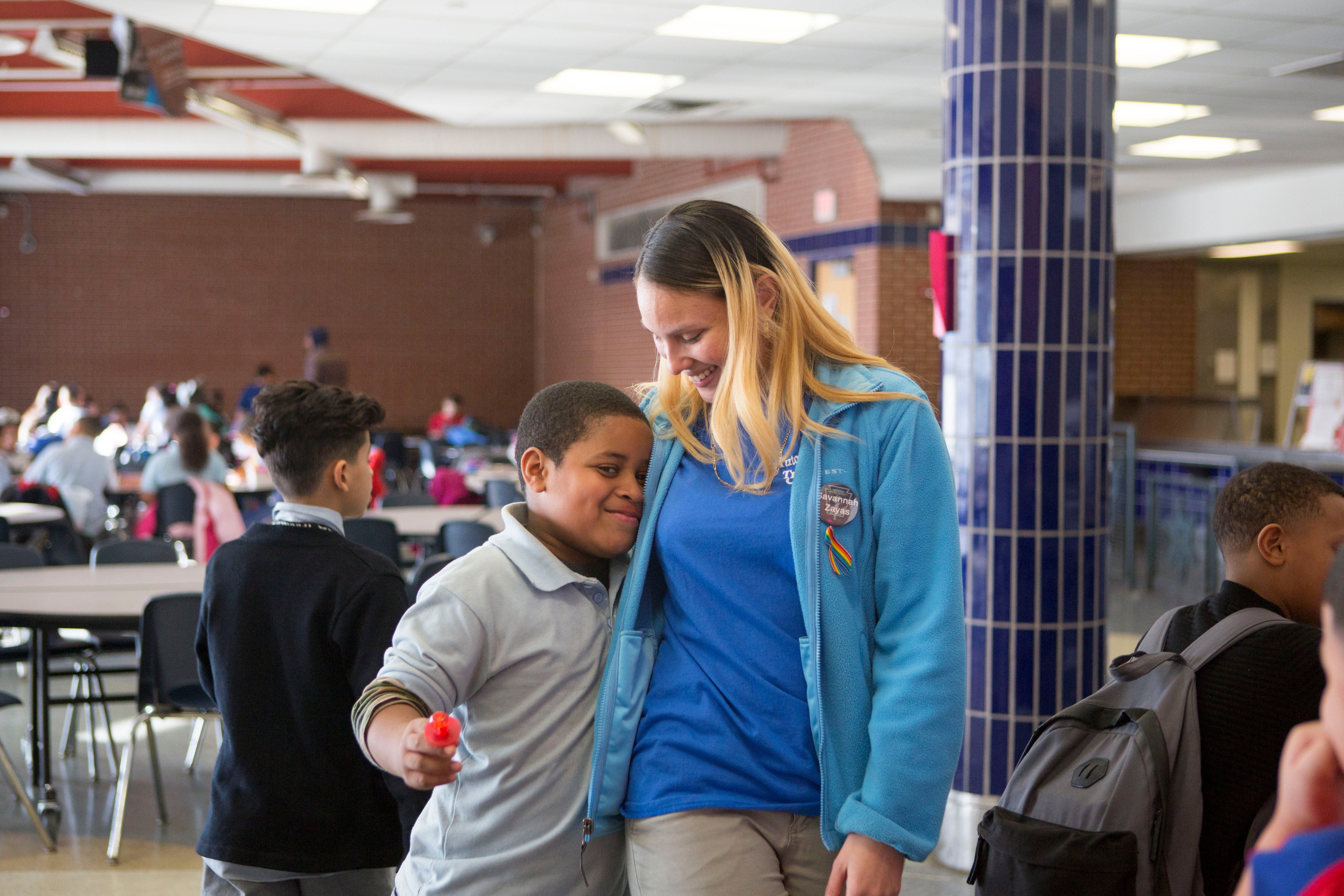
Be somebody
Everything in Savannah’s life was in a state of flux as she began her senior year at Edison. And day-by-day, week-by-week, she faced hurdles as she inched towards graduation day.
Savannah began her senior year with an ambitious daily agenda: Up at 6:15 AM, getting herself and Layla ready for the day and to school on time, without a car. At school, Savannah booked herself a tough slate of classes, including AP Chemistry, even though she had already fulfilled her science requirements.
After Edison, she would take the bus straight to her job working with younger kids at an after school program. Then she’d head back home on the bus in time to help make dinner for the family while doing her homework. Then she’d help Layla with hers, often falling asleep with textbooks and bedtime stories scattered on the floor around their bed.
“It’s just realizing that when she goes home her day isn’t over,” said Maura Bernt, Savannah’s boss at the after school program, which is run by The Providence Center, a North Philadelphia non-profit. “I can’t even wrap my mind around me being able to do that with like 10 more years of life experience and way more social supports.”

Savannah’s job at Providence has given her a baseline of stability, where she relishes the feeling of contributing to her community. She says that Maura and the other adults who run Providence have become her North Stars.
“This is my peace place. Every time I’m like upset, Maura’s like, ‘You sure you don’t want to go home?’ ‘No. This is my peace place. I need this, to come here.’ Because I know if I really am stuck and I can’t get myself together, I know they will help me,” said Savannah.
Since Savannah’s mother came back from prison, the two have had a relationship that’s teetered between mother/daughter and something more like equals running a household.
Savannah thinks of herself as a second mother to her younger siblings. Some of the utility bills are in Savannah’s name, and so is the lease of the house they rent. The family relies on Savannah’s income to supplement their welfare and food stamps.
“Most of time I have to give it all up, but sometimes I still try to take out like $10 or $20 dollars here and there because, like, sometimes we might run out of toilet paper,” she said.
But the arrangement has often led to friction, with Neverlyn thinking Savannah can be overbearing.
“Sometimes I love her to death, and there’s some days that I just can’t stand her because she just does things that is not cool,” said Neverlyn. “‘Oh, you can’t smoke in the house.’ I’ll smoke wherever I want. You’re not going to tell me what I can and cannot do.”
And Savannah often feels stifled by her mother, frustrated that her fight to escape poverty is often undercut by drama at home. She was set off early in the school year when she found an overdue notice from the gas company.
“I came across the bill and I opened it, and I’m like, ‘$900 dollars! What?!” That got me furious, very furious,” said Savannah. “And she just didn’t understand. ‘Yeah, you help me pay for it, but it’s in my name.’ My name is on the lease, and they look at it as, ‘I am Savannah Zayas not paying for that bill.’ Like, she just thought she could do it by herself, and she forgets, we don’t have a man in the house, so it’s mother and daughter that have to do this. And I told her, like, ‘I’m an adult; you’re an adult, and we need to talk. You know this is our household. These are our kids. We need to do this together. We can’t do this, you do your thing and I do my thing. It’s not going to work like that.’”
The tension between them gets at the very core of how difficult it can be to break cycles of generational poverty. The family struggles so much on a week-to-week basis that it’s hard for Neverlyn to understand when Savannah makes long term prospects a priority.

So when Savannah decided to take a minimum-wage job at a non-profit instead of earning more somewhere else, there was tension. When Savannah talked about going away to college instead of being around to help with her younger siblings, there was tension. And when Savannah expects her mom to take on more responsibilities with Layla so she can focus on school and work, there’s tension.
It’s all compounded by the fact that Neverlyn suffers from recurring kidney issues and a hernia — ailments that, combined with her felony convictions, make her job prospects slim.
“I’m just frustrated because I can’t work and do stuff the way I used to do for them. Now I just have to be home, taking painkillers everyday — just so I don’t have to feel pain,” said Neverlyn. “I just want to go back to when I’d get work and take care of my kids and not depend on nobody else. Because I hate to ask, I hate to ask for help.”
Neverlyn also struggles with bouts of depression, still dealing with decisions she made 20 years ago.
“I just regret giving them the father that I did,” she said. “I would have finished school. I would have had a nice job. We would have been in a nice place, not living in the ghetto and depending on public assistance. That was never my choice. My thing was to finish school, go to hair school and be able to be somebody. I know in hair school you’re not going to be somebody, but that’s what I wanted to do. And as soon as that man crossed me, everything went down.”
All of this snowballs into issues in Savannah’s life. At Edison, for instance, she’s been plagued by latenesses and absences that stem from prioritizing Layla — getting her to preschool on time, taking her to doctor’s appointments, etc.
Things she wishes she could count on her mom to do.
“When I wake up in the morning, it is very hard for me to get up because I get the sharp pains,” said Neverlyn. “And then, she used to be like, ‘Oh, mom can you take the baby?’ There were times that I would take her; there were times that I didn’t feel like taking her.”
Savannah expects her teachers to understand all of this and be flexible. Some are, some aren’t. Ironically enough, it was her childhood development teacher who gave her the hardest time this year.
“And she tells me, ‘Oh, well, you need to find a way to find somebody to come six o’clock in the morning, seven o’clock in the morning to take your daughter to school,’” said Savannah. “And I tell her, ‘Miss, I don’t have a way. I don’t have help. You don’t understand. I’m independent. You keep forgetting: I’m not only a student, I’m an employee and I’m a mother. I don’t just go home after school and do nothing, sit on my butt and do nothing.”
The list of stressors in Savannah’s life goes on. In October, Layla’s father was sentenced to five years in prison after being charged with a laundry list of offenses: from aggravated assault to statutory rape.
He already had little contact with Layla, but this cemented further the idea that Savannah is on her own as a parent.
Taking a step back and looking at Savannah’s situation, it’s easy to see why most people in her shoes end up collapsing under the weight of the pressure. And even someone like Savannah — with drive and resilience to escape — can reach a breaking point.
“Because it stresses you out and makes you want to give up,” she said.
Savannah seemed on the verge of a breakdown in February when she found out she got an ‘F’ on her report card in her childhood development class, largely based on her attendance.
“It just made me feel like I was really low,” she said. “I feel like I’m running down a hallway and I’m never going to reach the door.”
It was less about the grade itself and more about what it represented. For someone who takes school as seriously as she does, who truly believes education will be her salvation, the ‘F’ felt like all her efforts against the odds have been for naught — that if people can’t see how hard she’s fighting, that maybe she should stop.
“I’ve been trying so hard,” she said, “and I feel like people just want to see me fall.”
Thad been planning to meet and interview Savannah’s former teacher Marie Woodward alone. But with Savannah feeling so low, I invited her to come along.
We walked into Woodward’s new school, Olney Charter High, on a cold February Friday. Savannah, who had recently turned 20, wore the biggest smile on her face.
“I was like, I’m going to see Mrs. Woodward today!” Savannah told her as they hugged hello.

It was the first time they had seen each other in more than a year. And just getting the chance to catch up with her favorite teacher opened a flood of emotions in Savannah.
“She was always just there for us, always gave us motivation, and always made us feel better at the end. She was a good role model for me. It was emotional,” Savannah said, turning to Woodward in her new classroom. “I really miss you.”
“I miss you too, thank you,” Woodward said, rubbing Savannah’s back. “Thank you for your kind words.”
Savannah and Woodward talked for more than an hour and a half. Woodward helped her set a plan to overcome the “F,” and they laughed, telling parenting stories, marveling that their children are the same age. As time passed, Savannah’s body language changed. She seemed visibly lightened and started speaking with more confidence. Even her long-term career goals sharpened into focus.
“I want to be like how she is,” Savannah said, referring to Woodward. “I want to like get close to kids and let them know, like, ‘There are struggles, but I am going to be the one there.’ And I want to, like, achieve and be the teacher to see kids graduate that I taught. So, yeah, definitely made my decision: I’m going to be a teacher.”
Woodward told her she’d be fantastic.
“You’re so understanding. You’re so mature. You’re so reflective. You’re so compassionate — all of those things, absolutely,” said Woodward. “You’re unstoppable.”
“I’m so happy that I’m here,” said Savannah.
“I know. It’s so good to see you,” said Woodward. “You’re absolutely inspiring me, and you’re just really incredible.”
Savannah and Woodward parted with a hug, each saying ‘I love you.’ And as Savannah walked back into the cold North Philly night, she felt ready to take on the world.
“I just feel really happy. I feel calm. I feel pure,” said Savannah. “I feel like, ‘Now I got this, I’m going to get back on my ‘A’ game.’”
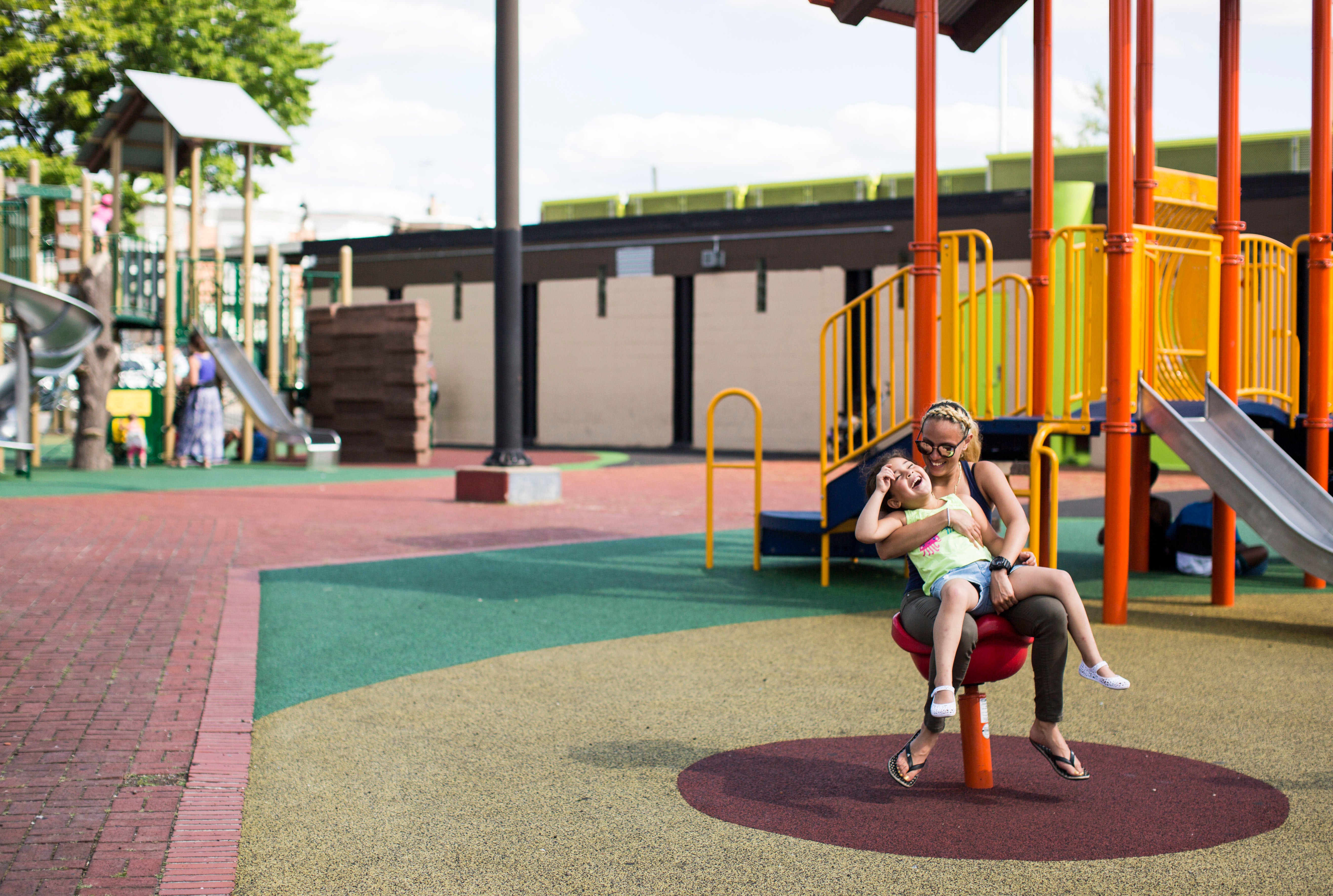
Beyond ‘Badlands’
Savannah’s story is so filled with trauma, heartbreak and struggle, that those elements are impossible to ignore. But her life also contains incredible joy.
First and foremost, this is evident in the relationship she has with her daughter. Her part-time job at Providence is another key example.
“She has this incredible pull and the students, I think, they see that,” said Providence’s Maura Bernt. “They see that like she can have hard days. She can come in overwhelmed, but she is so excited about sharing her gifts and strengths and enthusiasm and joy with people that you can almost see that she feeds off of it. It’s what makes it easier.”
At the core of Providence’s program is getting students to see themselves as empowered leaders in their community. This often begins by helping students understand their own story and giving them the confidence to use their voice — an area where Savannah has grown by leaps and bounds.
“When Savannah talks, people listen,” said Maura. “And I just keep trying to convince her to ‘keep using your voice.’ Like, that’s a power that not everyone has.”
Many times in our interviews, I would stop and ask Savannah if she was really comfortable sharing with the world all the intimate details of her life that she was sharing with me. The answer was always a resounding ‘yes.’
“Before I met you, like a long time ago, I wouldn’t talk. I wouldn’t open up to people…” Savannah said. “I’ve learned the more I open up, the more I, like, actually feel better about myself. I think about, like, the things that have happened to me when I was younger, and I feel like if I never went through any of that, I wouldn’t be as strong and confident as I am now.”
That confidence has been evident to Sydney Coffin, Savannah’s 12th grade English teacher at Edison.
“Savannah is a particular kid who is really, really buoyant,” he said. “I mean she’s really resilient in that she’s coming in the class every day. She’s one of the first ones there. She is ready to work. And there are so many kids like that, who are eager, enthusiastic. We often only hear about the kids who are challenging, or are going through really difficult stuff and act out in destructive ways.”
This is the lesson Coffin learns over and over again: that the beautiful lives alongside the ugly, grows out of it sometimes, and the two forever wrestle.
He tells the story of meeting a new student and his mother on the street outside their home.
“And some lady comes up to me with this brown, tar covered broken crack pipe and she’s like, ‘Please, please buy me a new one.’ And I was like, ‘I’m not going to buy you a crack pipe,’” said Coffin. “And I’m with the kid, and the kid’s like, ‘Mister, there are some fiends around here. You got to get indoors.’ And I was, like, ‘Wow.’ Think of a teenager dealing with that kind of stuff.”
The area where Savannah lives has a nickname, mostly used by outsiders. They call it “The Badlands.”
It’s a name that Savannah used to understand.
“I always thought in my head, like, ‘There’s kids, they just want to get tattoos, they just want to get guns, they just want to sell drugs. That’s all.’ I always thought I was always the — how do you say, like — you can always point me out from anyone else,” she said.
But now, working at Providence, looking around at her co-workers, seeing the efforts of her classmates, it’s a nickname she can’t stand.
“I see, like, just the community of young people who want to change things,” she said. “And, like, I never knew that that was here in such a place that they call ‘Badlands.’”
One of the people who helps keep Savannah optimistic is Luis Felix, who’s also a senior at Edison. Like her, he focuses on school, works a part-time job and actively avoids the drama of the streets.
“Cause he’s got brains,” Savannah said with a laugh, giving Luis a playful fist bump as they drove through their neighborhood. Block by block they passed people standing out on corners in the middle of the afternoon, others clearly in a heroin stupor.
“I knew that doing what I see out here in society is not going to get me to where I want to get to,” said Luis, who plans to become a mechanic after graduation.
After years of being friends, the pair began dating recently. For Savannah, it’s a first: a positive romantic relationship built on mutual respect and admiration.
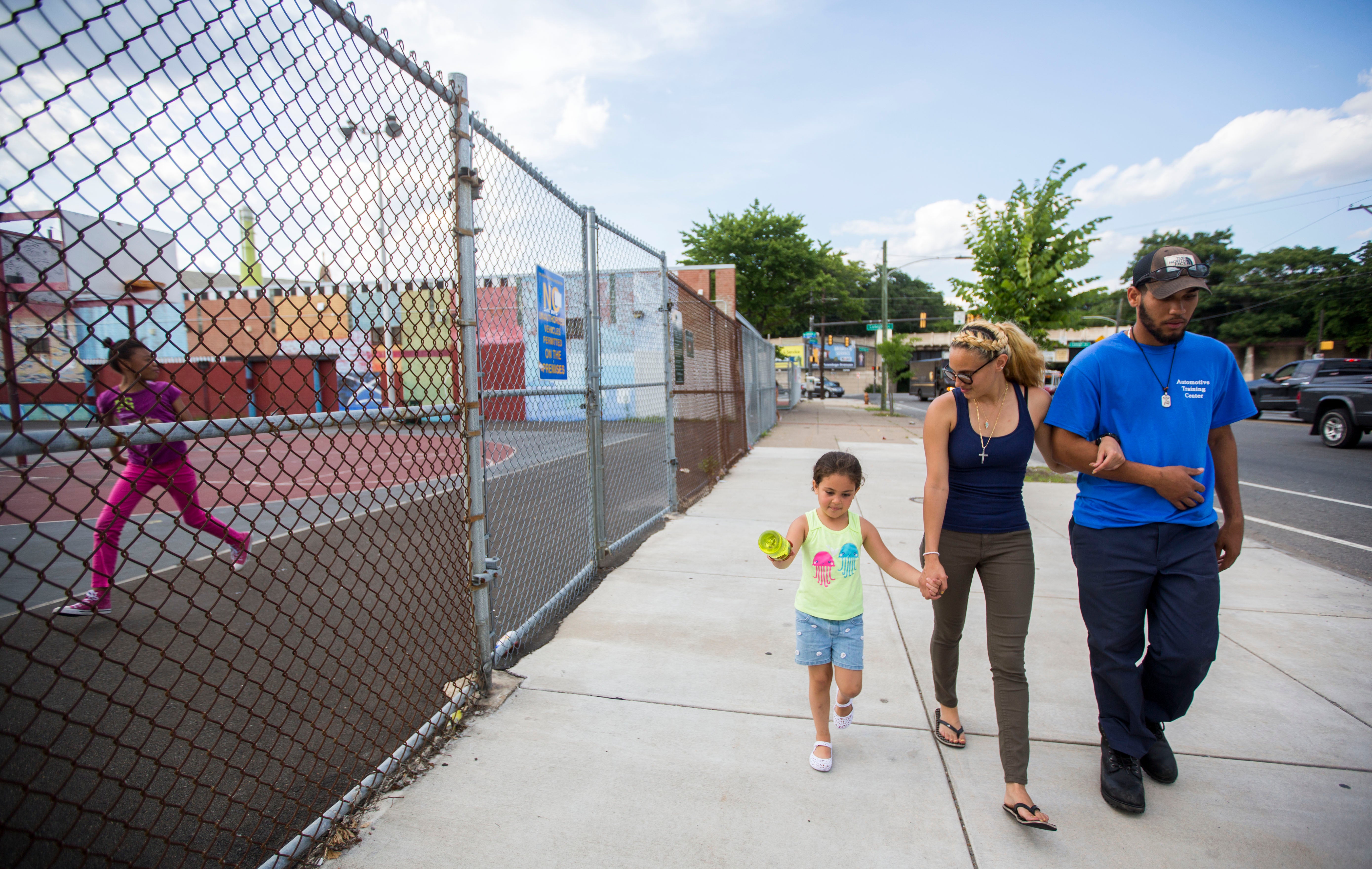
“If I’m having a frustrating day, I’ll just tell him, like, ‘Listen, I’m having frustrating day and I don’t want to talk about it right now,’” she said. “Five minutes passed, I’m talking about it. And he’s such a good listener.”
“I can honestly say, she was my motivation, because before I met her I was torn. I didn’t know what to do with myself,” said Luis. “I never had anybody care for me the way she cares for me. She takes care of me. She helps me out when I need the help. She gives me advice, how to overcome certain situations. And that’s how she is, that’s her personality, and I appreciate that so much from her.”
As February rolled into March, the same problem at school that plagued Savannah from the beginning of the year — latenesses and absences — continued. And as the days went by the threat of not graduating seemed to become more likely.
Savannah’s issues with attendance continued to stem from her juggling school and motherhood.
“I’m having to deal with two things that I care about the most,” said Savannah. “And that’s tough for me, because I do want to be there actively for my daughter.”
It’s a problem that she continued to hope that her mother, Neverlyn, would better help her handle.
“I try to explain to her: If she would help me, my absences wouldn’t be so high. If she would help me, my latenesses wouldn’t be so many. You know. It’s just the ‘ifs.’ I can’t go back. I still have to do what I have to do. That’s what I try to explain to my teachers: It’s hard to do things when you don’t have support.”
Neverlyn’s health issues, though, remained a hurdle.
“If I walk, I have to walk with somebody, because, if not, I stumble,” said Neverlyn. “And I’m like, ‘I’m only 36 years old, and all this medical stuff is just showing up.’”
And the very foundation of Savannah’s relationship with her mom also continued to be strained. Many times throughout the year things seemed on the brink of major melt down.
For instance, the pair had a blow-up argument in the winter where Neverlyn threatened to throw Savannah out.
“I said, if you leave out this door your ass is not coming back,’” Neverlyn recounted. “‘Oh yes, I’m coming back because my name is on the lease.’ I don’t give a shit what’s on the lease. You leave this door and you’re not coming back.”
Savannah tries to be upfront with her teachers about the challenges she faces, and some, like Coffin, really appreciate it.
“She came to me like a month before the semester began and she said, ‘I just wanted to caution you that I do have a kid and there may be times when I have to miss a day or two because my kid’s sick or something, and I just wanted to know if it was OK with you that, like, I get the work from you and I’ll do it. Like, I will do it.’ I mean, she was really sure about that,” said Coffin. “And I was like, ‘Yeah, totally.’”
Savannah’s commitment to the work has been clear. Her overall grade point average has remained high, and she’s consistently ranked near the top of her class.
But her attendance has been frustrating for school leaders, who expect her to be in school consistently, and on time. The principal, Awilda Ortiz, is a product of the surrounding neighborhood, and in general, plays more the role of ‘tough and no-nonsense leader’ than ‘warm and fuzzy shoulder to cry on.’
She declined to be interviewed on the record for this story.
Ortiz did give me a tour of the school, which has some very impressive career and technical education facilities. That day, when she talked with Savannah about her attendance, Ortiz sternly criticized her for thinking she could rely on her mother to help with Layla. And she warned her that if the latenesses and absences continued, her diploma was at stake.
Savannah took the message hard.
“I wish I was there in her brain to see what she sees of me that’s wrong, or that I’m not good enough or whatever,” said Savannah. “I just want to know. Like, I really just want to know.”
Savannah’s dismal attendance had other consequences. It cost her her spot in the National Honor Society and it pushed her to drop her AP Chemistry course — two things that had been major points of pride for Savannah early in the year.
With all this in mind, she decided to reconsider an offer from her grandparents, who had recently moved to Florida. In November, they said they’d be willing to take Layla for the rest of the school year so Savannah could focus on her classes.
At first Savannah declined, not wanting to be so far from her daughter for so long.
“I don’t think my daughter would want this because, you know, she’s four, and she kind of knows a lot now,” Savannah said in November. “So imagine, like, you know, the whole change. It’s a change for her.”
But with graduation pressure mounting, she accepted the offer.
In early March, Layla moved to Florida while Savannah stayed behind to finish school. She left on a Sunday.
“I cried the whole entire day Monday,” said Savannah. “I’m like, ‘Oh my god, I’m so not used to her not being near me.”
She believed, though, that it was the best decision.
“I’m been getting a lot of work done and I don’t have that — not saying that it was like an obstacle — but I don’t have to be stressed out worrying about whether my mom’s going to, like, pick her up from school,” she said.
But Layla’s time in Florida didn’t last long.
Savannah’s grandfather’s health worsened, and it was decided that it’d be better if Layla came back to Philadelphia — where Savannah’s attendance problem was about to get a whole lot worse.
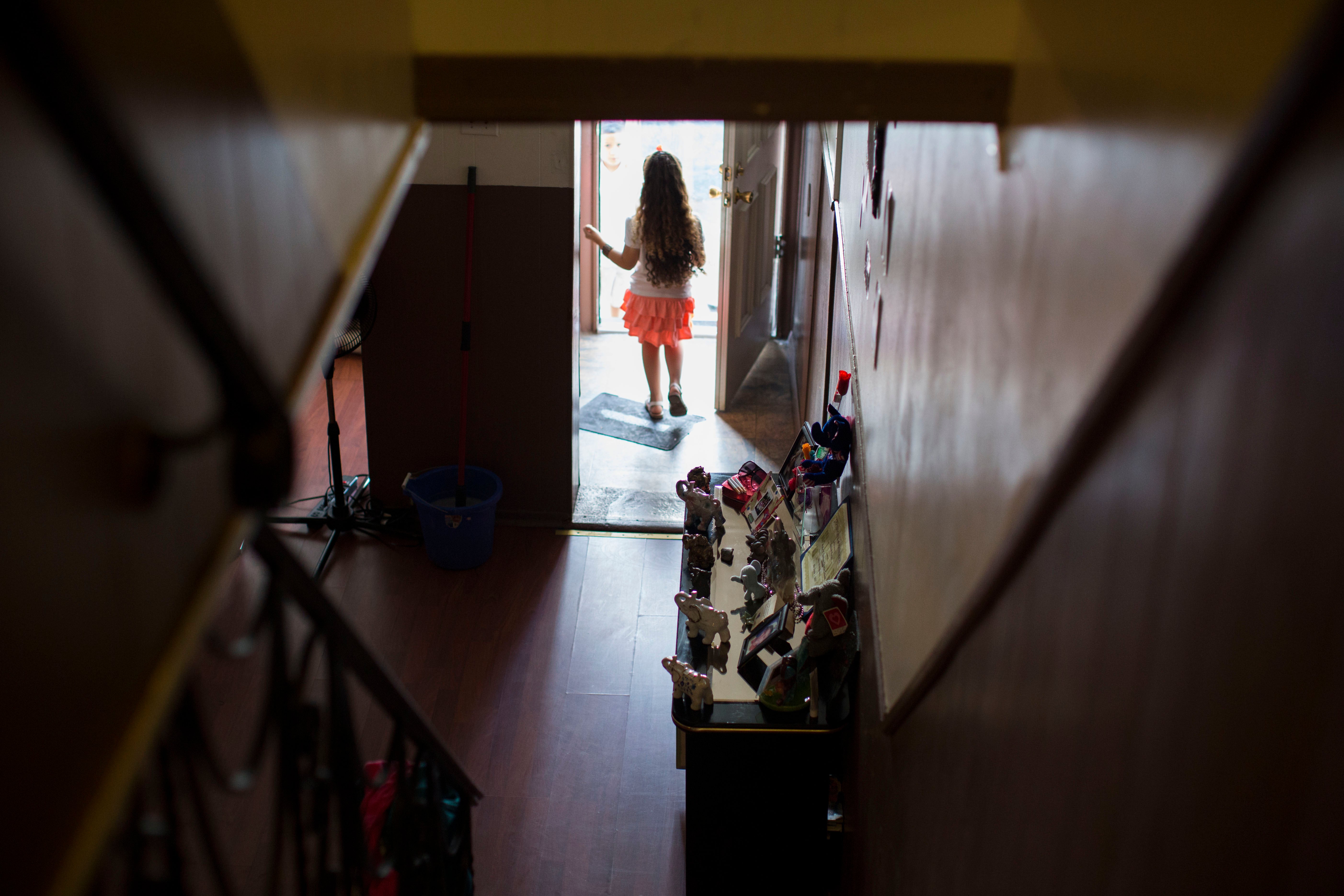
In late April, Savannah’s mother came to her with a last-minute problem. It was a Saturday.
“She was like, ‘Nanie.’ I was like, ‘Yes.’ ‘I need money for two bills.’ ‘What bills?’ And she told me. And I took a deep breath,” said Savannah. “And I said ‘how much?’”
Savannah feared not coming up with money immediately would mean utilities would be cut off. She imagined giving Layla baths in cold water.
“She caught me out of nowhere,” said Savannah. “It was just like, ‘What I’m going to do?’”
Savannah had recently applied to a local grocery store, wanting to pick up night shifts in addition to her job at Providence to save more money. When this news hit, she talked to the store over the weekend and was given a chance to start Monday morning — meaning she’d miss more school.
“And my mom was like, ‘That’s on you.’ And I was like, ‘Well, it is on me, because if I don’t do it, who’s going to do it?’” said Savannah.
She skipped school all week to take the day-shift at the market. She worked six days straight with a cash pay out at the end of each day.
“My body was working, but I felt dead inside, like, I just felt like, ‘Come on, hurry up, let’s just get through this. We doing this for the money,’” said Savannah. “It was so horrible.”
After paying the bills, Savannah quit the job at the market and went back to school, but when she returned there were consequences. The principal told Savannah that even if she technically earned a diploma in June, her poor attendance record would bar her from attending the graduation ceremony.
It’s hard to explain how much of a blow this was for Savannah. She’d been fighting since age 14 to make it to that exact moment, to wear that cap and gown, to prove wrong all the doubters.
And suddenly it wasn’t going to happen.
“I don’t cry because I want to cry,” Savannah said shortly after this decision, tears streaming down her face. “No, I’m crying because I’m emotionally attached to something that I love. I’m passionate about this. I decided to do things because I wanted to be different. I wanted to shine. I wanted to be the one that they said, like, ‘Wow, this is a mother in this school that’s been working since 10th grade, that’s been getting good grades.’ I want them to see this person. I don’t want them to see the person that, ‘I’m taking care of my responsibilities, so now I got disciplined.’ I don’t want them to see, like, ‘OK, this is the rules and you broke the rules. This is what you get.’ Like I don’t want them to see that. I want them to see the person that I am. I want them to see the striving, hard, robust person that I am.”
In truth, Savannah had options that would have allowed her to avoid missing school that week. She had enough money in her savings account to cover the bills, but she’d been planning to use that money to buy a used car.
“I just did what I did. I wanted the car. I’m going to college and I need the car. So I prefer to pay for my car because I need it,” she said.
It’s the type of decision that many high school seniors don’t need to make — and right or wrong — Savannah owns her choice.
“I’m responsible for my own decisions and nobody else can do what I do,” she said. “So I had to do what I had to do, because nobody else was going to cough up that money and give it to me. Nobody else was going to buy me a car. So, I don’t know. I’m starting not to care little by little about what people think…People are not going to understand me. People are never going to understand. No one’s going to understand until I be like, ‘Come be me for a day, and let’s see how you going to survive.’”
By May, as the school year drew near a close, Savannah couldn’t help but become jaded. Not being allowed to attend graduation made it feel like her long journey was coming to an anticlimactic end.
“It’s overwhelming and like upsetting because the day is coming, and it’s just, like, I’m not going to be able to be there,” she said.
But, then, just a few weeks before the big day, after months of agonizing over if she would make it — and after being told she wouldn’t be able to attend — things suddenly changed.
With little explanation, school leaders decided that a whole group of students in similar circumstances would graduate and could attend the ceremony.
But by the time the news came in, Savannah seemed completely disillusioned. Having to wait in limbo for something she felt she so clearly deserved made her feel unacknowledged, unwanted. So she talked about skipping the ceremony anyway, wanting to save on the $200 graduation fee.
“I’m not, like, interested. I don’t feel connected,” she said. “I don’t feel involved. It’s just not how I wanted it to be, or how I expected it to be.”
A spokeswoman for the School District of Philadelphia could not explain what school policy changed to allow more students to graduate or attend the ceremony. The principal of Edison declined to answer questions.
Savannah’s spirits, though, did eventually lift, largely thanks to her friends and mentors at Providence. The non-profit threw a graduation party celebrating Savannah and another student from nearby Kensington High.
Inside Providence’s cramped headquarters, nestled in a rowhome at 4th and Lehigh, the teens, with slices of pizza and cups of soda in their hands, took turns playing pop songs on a boombox through their cell phones. Savannah laughed with friends as Maura cracked jokes and reminisced about the memories they all shared. The room was bright with fellowship.
Bringing the crowd to a hush, Maura gave a speech commending the two graduates for overcoming steep odds and setting an example for the younger students in the neighborhood.
“You did it while facing all of those things, and our kids got to see that. And that more than anything we could say to them is really a remarkable way to show them that, despite those challenges, being a leader in your community is possible,” Maura told the crowd. “And caring for people with love and compassion and building community is possible even when it’s hard. So thank you.”
Savannah gave Maura a long hug and looked happier than she’d been in months.
“It’s like, that’s my family. Those are the people that I look forward to seeing everyday, and speaking to everyday and spending my time with,” Savannah said. “They just make me feel really happy.”
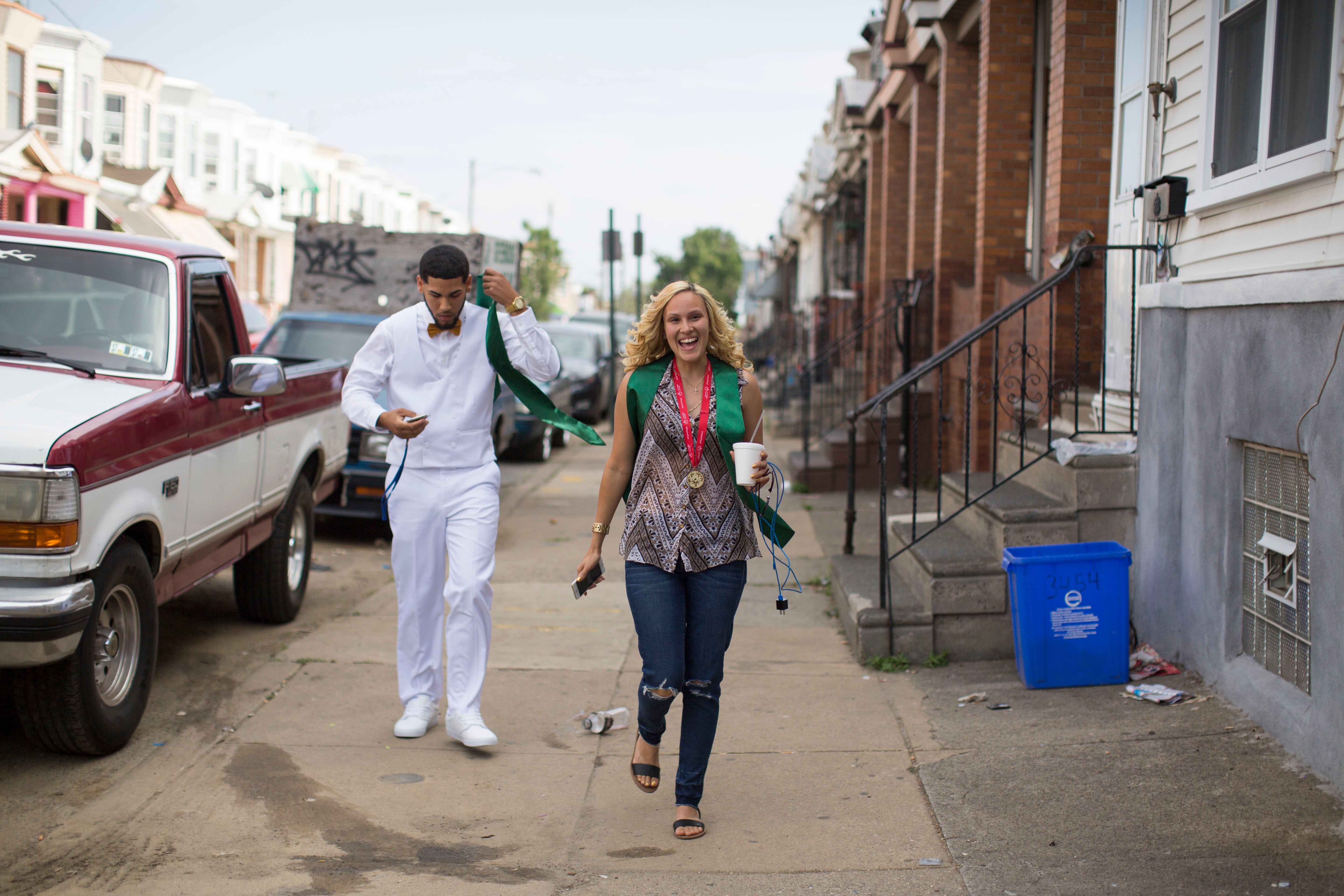
With honors
June 16th, 2017 is a day Savannah will never forget.
She did in the end attend the graduation ceremony after Edison’s principal came to her personally and offered to cover Savannah’s graduation fees out of her own pocket.
“The one person who put me through so many difficult challenges actually cared,” said Savannah.
Posing for pictures outside her house before the ceremony, Savannah beamed with pride as Layla and Luis stood by her side. Both graduates wore the special gold gowns and green ‘honors’ sashes reserved for the top 25 students in the class.
Neighbors walking by congratulated Savannah as Layla giggled, tightly hugging her mother’s leg. Luis had so many butterflies in his stomach he could hardly speak.
“My voice is all shaky,” he said. “I am kinda nervous.”
Earlier in the day, Neverlyn had been in an awful mood, frustrated about money and storming around the house. But she later calmed down, and seeing Savannah in her cap and gown brought her close to tears.
“I’m kind of proud she made it. I didn’t think she was going to make it, and she did,” said Neverlyn.
But Neverlyn decided against attending the graduation, saying she wanted to avoid other people from the neighborhood who she didn’t want to see.
“I know, with my behavior, the way I am today, it’s not going to go good,” she said. “So I’m not going to mess it up for her.”
The ceremony was held on Temple University’s campus in a beautiful auditorium with stained glass windows. Inside, the mood was jubilant, electric, with smiles all around.
Four years ago, more than 360 students came to Edison High School as freshman, the class of 2017 — each one of them with a story worth telling. Along the way, some rose and some fell. And in the end, only about half of them persisted through the four years to cross the stage that night.
So when the principal made the rite of passage official, those who made it went justifiably bonkers. They cheered like mad, their graduation caps raining down all around them in a sea of Edison green and gold. Savannah danced in the front row, pumping her fist in the air, hugging everyone in her aisle.
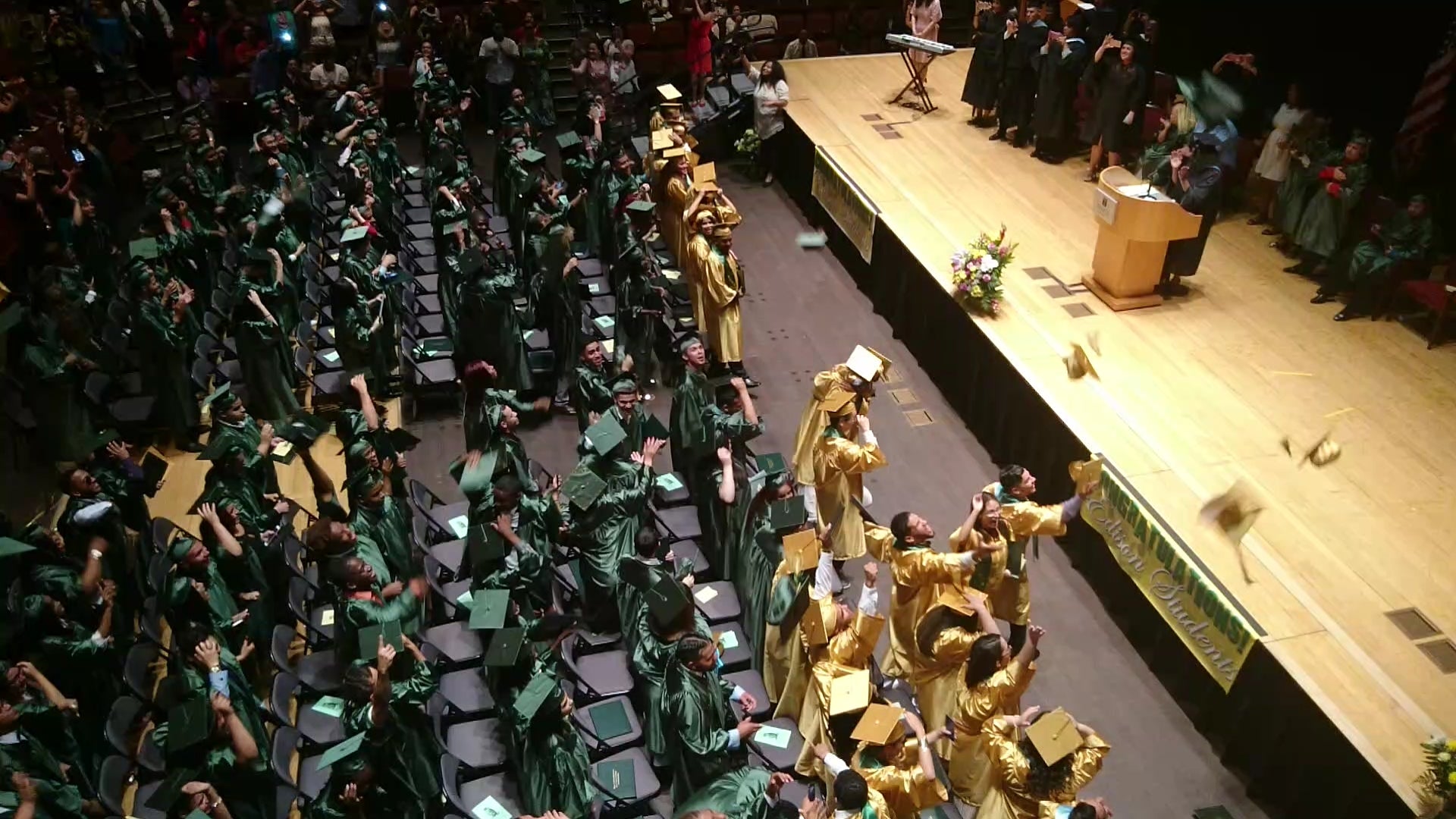
Afterwards, along Broad Street with her friends, Savannah looked radiant, beaming with excitement. She had done the very thing so many told her would be impossible, and she did it with honors.
But, as much as she tried, she couldn’t hide the twinge of sadness in her eyes. During the event, she had been craning her neck, hoping to find faces she recognized in the seats of the auditorium. Other than her daughter, no members of Savannah’s immediate family came to the ceremony.
Maura, though, was there, and so was Mrs. Woodward.
“And I was like, ‘Thank god they came,’ because I didn’t feel like I had anyone to congratulate me, just my friends, but then I saw you guys, and especially her,” she said of Woodward. “She was here in the most important moment that I could be apart of, and I’m just so happy.”
In an ideal world, the story would end here, reflecting in the glow of Savannah’s accomplishment. But, the positive buzz of graduation faded all too quickly.
Just days later, tension between Savannah and Neverlyn reached an apex when another fight about money — this time about a $5 bill — turned violent, something that hadn’t happened in more than five years.
“She started hitting me. She started punching me in my face, right in front of Layla,” said Savannah.
Savannah, who wore a black eye in her first week as a high school graduate, decided she could no longer continue living in that house.
“I feel like if I just stay there, I’m not going to succeed, because that’s what I feel like: she wants me not to succeed,” she said.
Lacking other options and with little notice, Savannah and Layla both moved to Florida to stay with her grandparents. They plan to be there at least for the summer, likely for longer.
Savannah had been planning to attend the Community College of Philadelphia in the fall. At this point, she doesn’t know exactly what’s next, but she’s determined to move forward and is already talking about college graduation.
“I’m going to do it regardless, and I’m going to take another picture with my cap and gown with my degree, because that’s what I’m going to do,” Savannah said. “I’m not going to stop just because she keeps doing this to me. I’m not.”
Succeeding at the next level will be a daunting task, made harder in Florida without the close proximity of the support system she found at Providence.
But no matter the challenge, Savannah has all the proof she needs to know that she can rise above whatever comes her way. It’s within her, the DNA of a fighter, the fire of someone who burns to overcome. And when life converges to overwhelm her, when every turn seems destined to trip her up, she now has a vivid memory to hold close to her heart. In it, she’s walking across the stage on a June night in Philadelphia. She hears her name ringing in the rafters of the auditorium. She’s handed a diploma. A sea of her peers cheer, and in that moment she looks over at Layla — her engine, her energy — and she sees her daughter watching intently, soaking it all in, jumping for joy in the aisle.
“I’m happy that she saw what it’s really for,” she said after the ceremony that night, “what all those late nights and homework assignments and studying — all those times that I couldn’t play with her and I couldn’t do things, and now I get to show her, ‘This is why, baby! This is why.’”

Savannah’s story makes up the first three episodes of the “Schooled” podcast, which was produced at WHYY in Philadelphia for Keystone Crossroads, a collaborative of Pennsylvania public media stations. Charlie Kaier engineered and mixed the sound for the podcast. This work was made possible through a grant from the William Penn Foundation.
WHYY is your source for fact-based, in-depth journalism and information. As a nonprofit organization, we rely on financial support from readers like you. Please give today.




